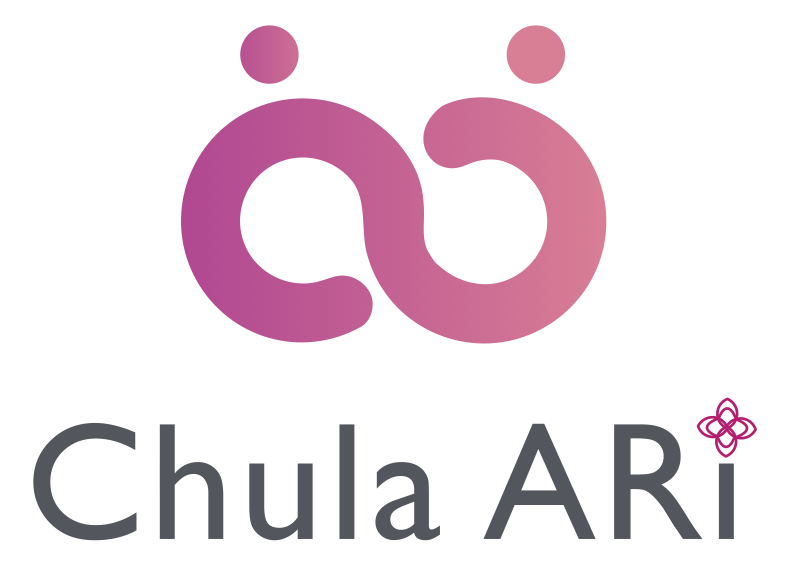จุฬาอารีกับการพัฒนาอย่างยั่งยืน (SDGs)
ในศตวรรษที่ 21 การก้าวสู่สังคมสูงวัย เป็นปรากฏการณ์ที่ไม่อาจหลีกเลี่ยงได้ทั่วโลก ในมิติหนึ่ง การเป็นสังคมสูงวัย สะท้อนถึงความสำเร็จของมนุษยชาติ ในการที่จะมีชีวิตยืนยาวขึ้นอย่างมาก แต่การเปลี่ยนแปลงเป็นสังคมสูงวัยอย่างรวดเร็วในขณะที่ประเทศยังเป็นประเทศกำลังพัฒนาเช่นประเทศไทย กลับกลายเป็นประเด็นที่ท้าทายยิ่งต่อคุณภาพชีวิตประชากรและการพัฒนาประเทศอย่างยั่งยืน
จุฬาลงกรณ์มหาวิทยาลัยในฐานะมหาวิทยาลัยแห่งชาติที่เป็นที่ยอมรับในระดับโลก มีศักยภาพและมีพันธกิจที่สำคัญ ที่จะเข้ามาชี้นำหาทางเลือกที่ดีที่สุดให้แก่ประเทศในบริบทของสังคมสูงวัยด้วยการผนึกพลังปัญญาจากทุกศาสตร์ของมหาวิทยาลัย คือ วิทยาศาสตร์ สังคมศาสตร์ และมนุษยศาสตร์ รวมทั้งสามารถเป็นศูนย์รวมในการผนึกพลังภาคีเครือข่าย ทั้งภายใน และภายนอกมหาวิทยาลัย ทั้งในท้องถิ่น ระดับชาติ และระดับนานาชาติ เพื่อรับมือกับประเด็นท้าทายด้านผู้สูงอายุและสังคมสูงวัย ภายใต้โครงการ Chulalongkorn Ageing Research Innovation หรือที่เรียกโดยย่อว่า Chula ARi
โครงการจุฬาอารีเป็นชุดโครงการวิจัยที่ได้รับการสนับสนุนจากโครงการพัฒนาวิชาการ ก้าวสู่ศตวรรษ ที่ 2 ระยะที่สองของจุฬาลงกรณ์มหาวิทยาลัย ทิศทางและเป้าหมายของโครงการจุฬาอารีเป็นการบูรณาการ สหศาสตร์ด้านผู้สูงอายุ ด้านการวิจัย และด้านการบริการวิชาการเชิงรุกเพื่อพัฒนาองค์ความรู้ งานวิจัยและนวัตกรรมนำไปสู่การกำหนดนโยบาย การพัฒนาระบบกลไก ตลอดจนการขับเคลื่อนนโยบายไปสู่การปฏิบัติ เพื่อส่งเสริมคุณภาพชีวิตของผู้สูงอายุแบบองค์รวม ทั้งมิติเศรษฐกิจและการมีส่วนร่วม ประชากรและสังคม สุขภาพ สภาพแวดล้อม และเทคโนโลยีและนวัตกรรม
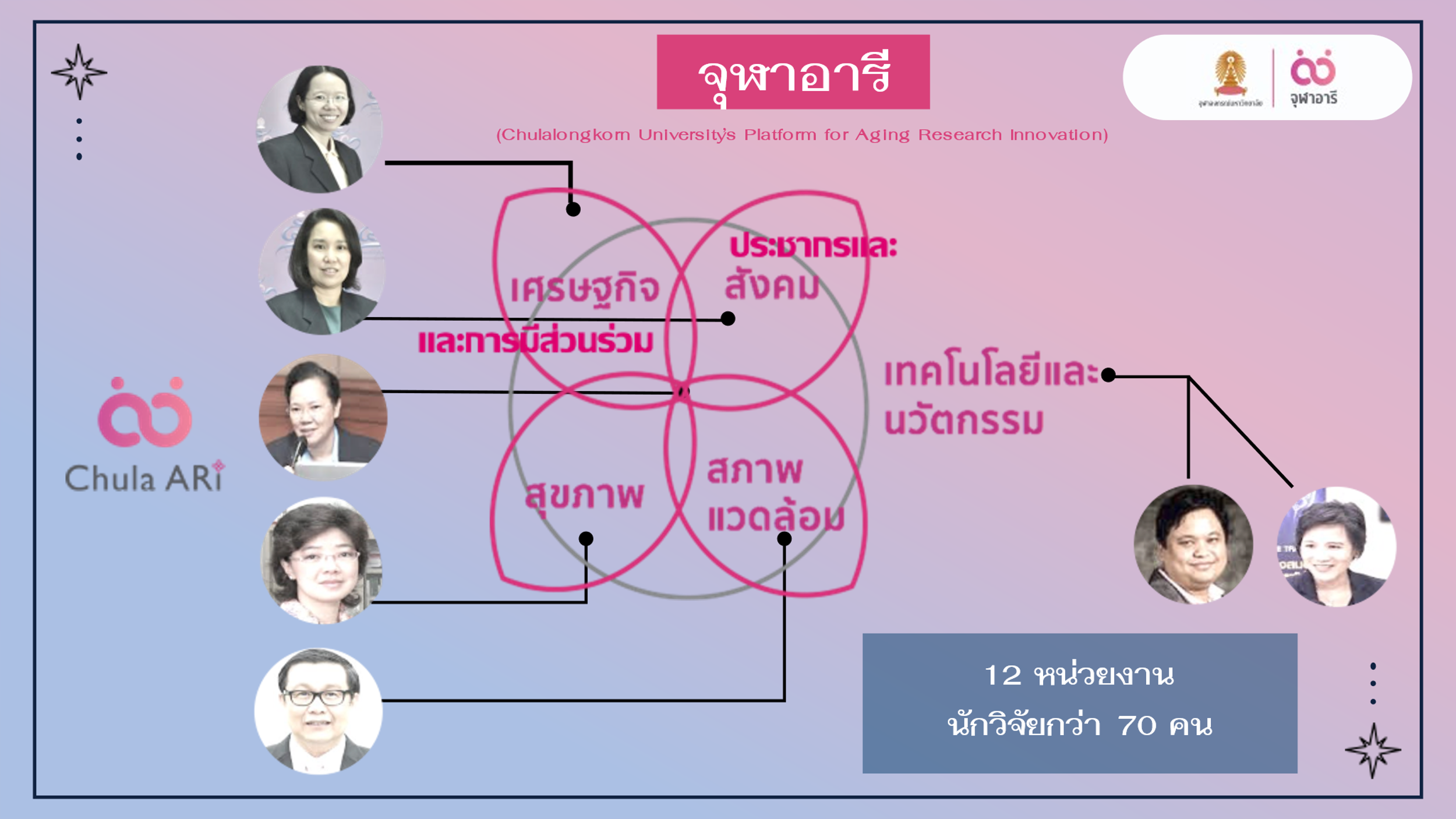
โครงการจุฬาอารี เล็งเห็นความสำคัญของการพัฒนาระบบฐานข้อมูลเพื่อต่อยอดไปสู่การพัฒนาคุณภาพชีวิตของผู้สูงอายุในทุกมิติ จึงได้มีการวางรากฐานและจัดทำระบบฐานข้อมูลผู้สูงอายุ ตั้งแต่การจัดเก็บจนถึงการนำเสนอข้อมูลผ่านแอปพลิเคชัน จากการพัฒนาระบบฐานข้อมูล ต่อยอดมาสู่การเฝ้าระวังผู้สูงอายุ หรือที่เรียกว่า Ageing Watch ซึ่งเป็นการเฝ้าระวังติดตามสถานการณ์ที่เกี่ยวข้องกับผู้สูงอายุ รวมถึงเสริมสร้างความรอบรู้เพื่อลดความเสี่ยงและเพิ่มคุณภาพชีวิตผู้สูงอายุและเผยแพร่ข้อมูลและความรู้สู่สาธารณะ
ในมิติเศรษฐกิจ โครงการจุฬาอารี เล็งเห็นถึงความสำคัญยิ่งของการรับมือด้านเศรษฐกิจทั้งสำหรับผู้สูงวัย
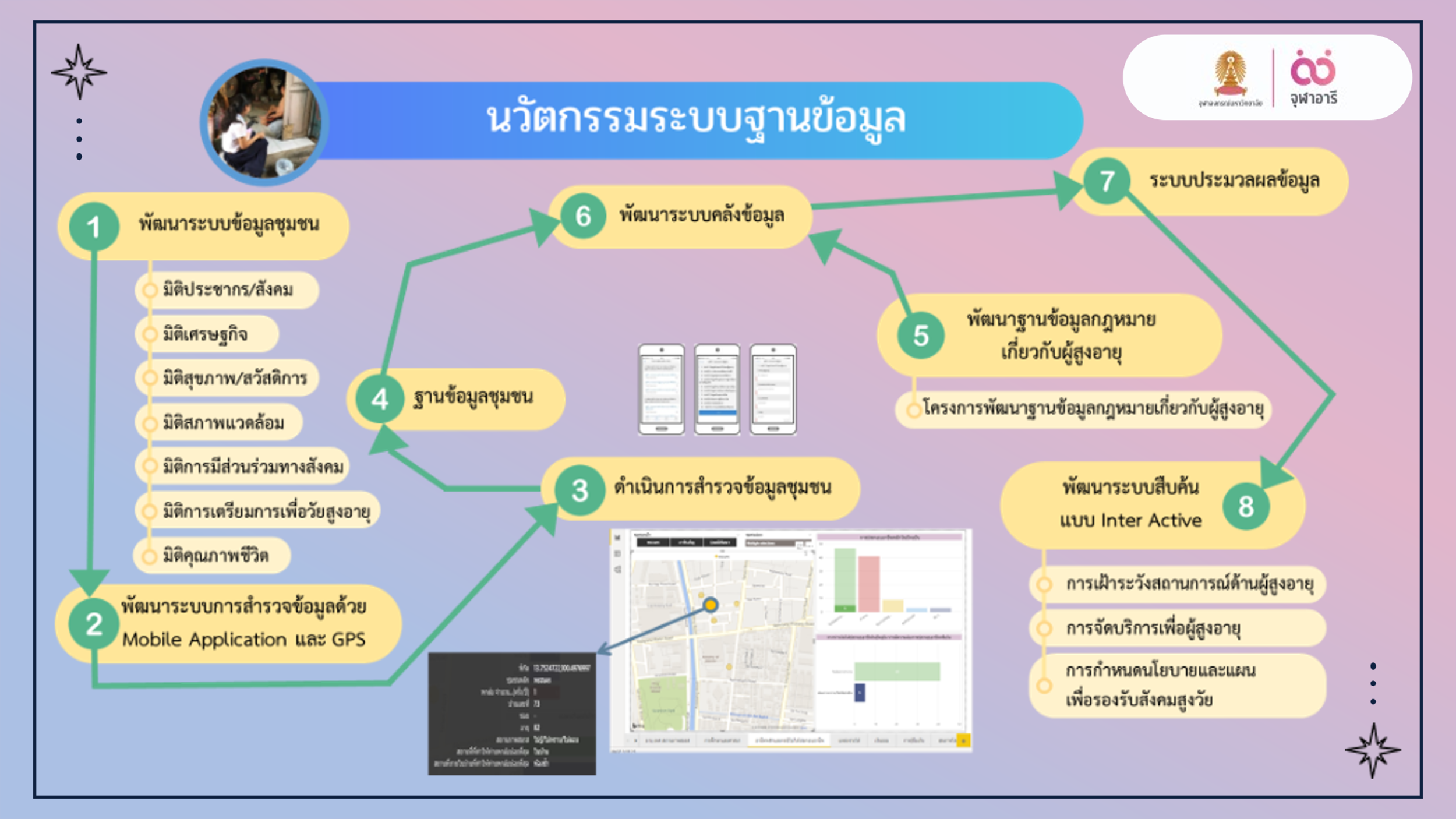
และผู้ที่กำลังเข้าสู่การเป็นผู้สูงวัยในชุมชนเมือง เนื่องจากอายุที่มากขึ้นเป็นอุปสรรคต่อการแสวงหารายได้ และ
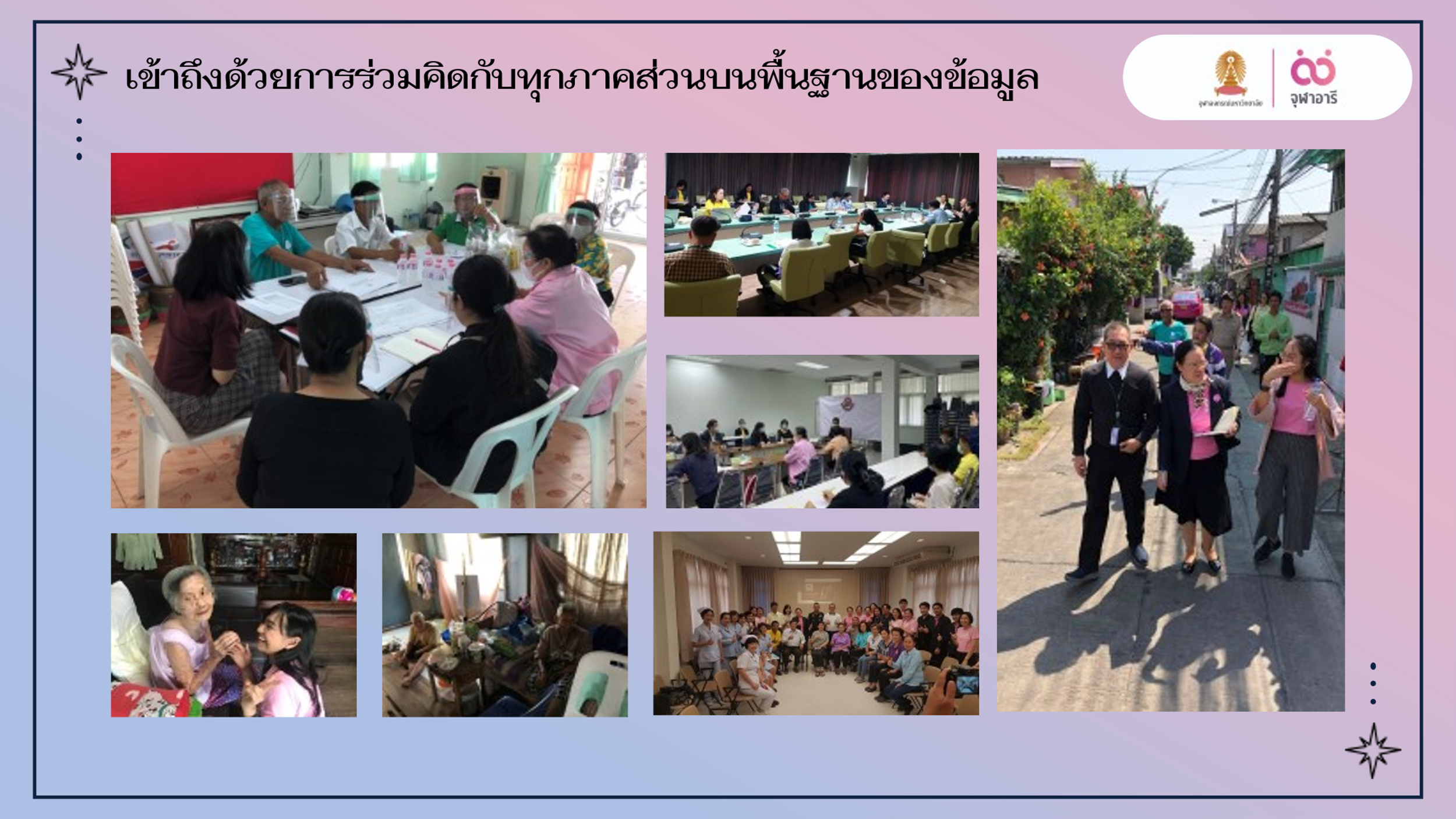
รายจ่ายมีมากขึ้น โครงการจุฬาอารี ได้มีการจัดทำระบบหลักประกันทางเศรษฐกิจ ทั้งส่งเสริมการออม และจัดอบรมเพื่อการสร้างรายได้
รวมถึงการพัฒนาในมิติสุขภาพ คณาจารย์ในโครงการจุฬาอารี ได้จัดทำระบบการดูแลด้วยหัวใจและระบบการดูแลที่บ้านแบบเข้มข้น ซึ่งเป็นระบบการดูแลผู้สูงอายุและผู้ป่วยติดเตียง พร้อมทั้งเพิ่มพูนความรู้ผู้ดูแลผู้สูงอายุทั้งยังมีการจัดทำสื่อการเรียนรู้หลายรูปแบบ เพื่อสร้างความรอบรู้ด้านสุขภาพให้กับผู้สูงอายุ ทั้งเรื่องอาหาร การออกกำลังกาย การดูแลสุขภาพช่องปาก เหงือก และฟัน มีการตรวจดูแลสุขภาพกายและสุขภาพจิตของผู้สูงอายุเชิงรุกในพื้นที่ และการเฝ้าระวังสถานการณ์โควิด-19 ในชุมชน การทำแผนรับมือกับวิกฤตโควิด-19 และตลอดจนเสริมพลังชุมชนและให้การสนับสนุนเครื่องอุปโภค บริโภคตามความจำเป็นของชุมชน
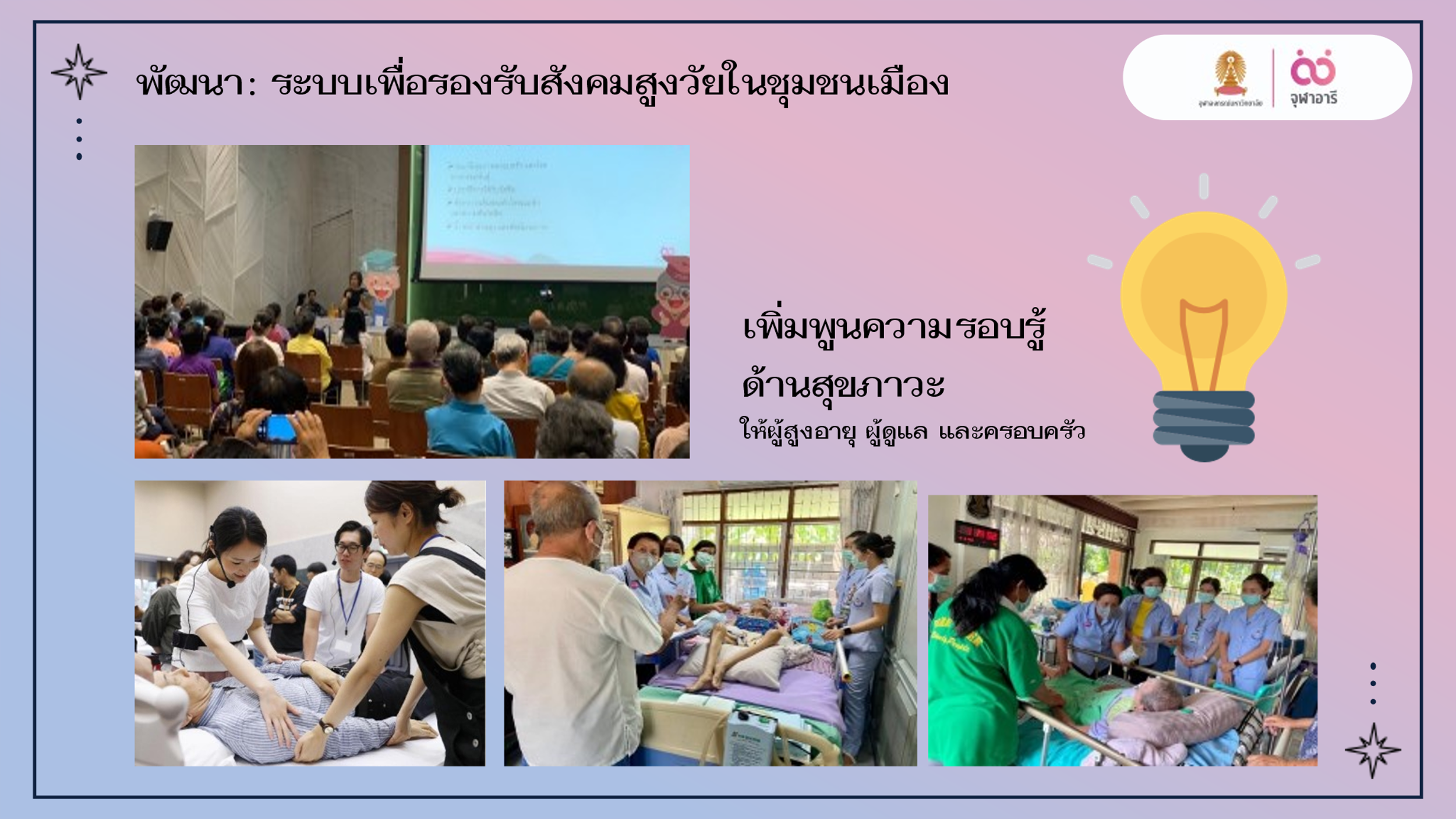
ในมิติสภาพแวดล้อมของผู้สูงอายุ โครงการจุฬาอารีได้นำร่องปรับเปลี่ยนสภาพบ้านที่อยู่อาศัยให้เหมาะสมกับการรองรับผู้สูงอายุในบ้าน เอื้อให้ผู้สูงอายุใช้ชีวิตอย่างปลอดภัยทั้งภายในและภายนอกบ้าน รวมถึงมีการปรับระบบการสัญจรเพื่อให้ผู้สูงอายุสามารถเดินทางได้อย่างสะดวกและปลอดภัย ให้ผู้สูงอายุสามารถใช้ประโยชน์ในการทำกิจกรรมเสริมคุณภาพชีวิตผู้สูงอายุ และสร้างความมั่นคงทางอาหารของชุมชนในภาวะวิกฤต
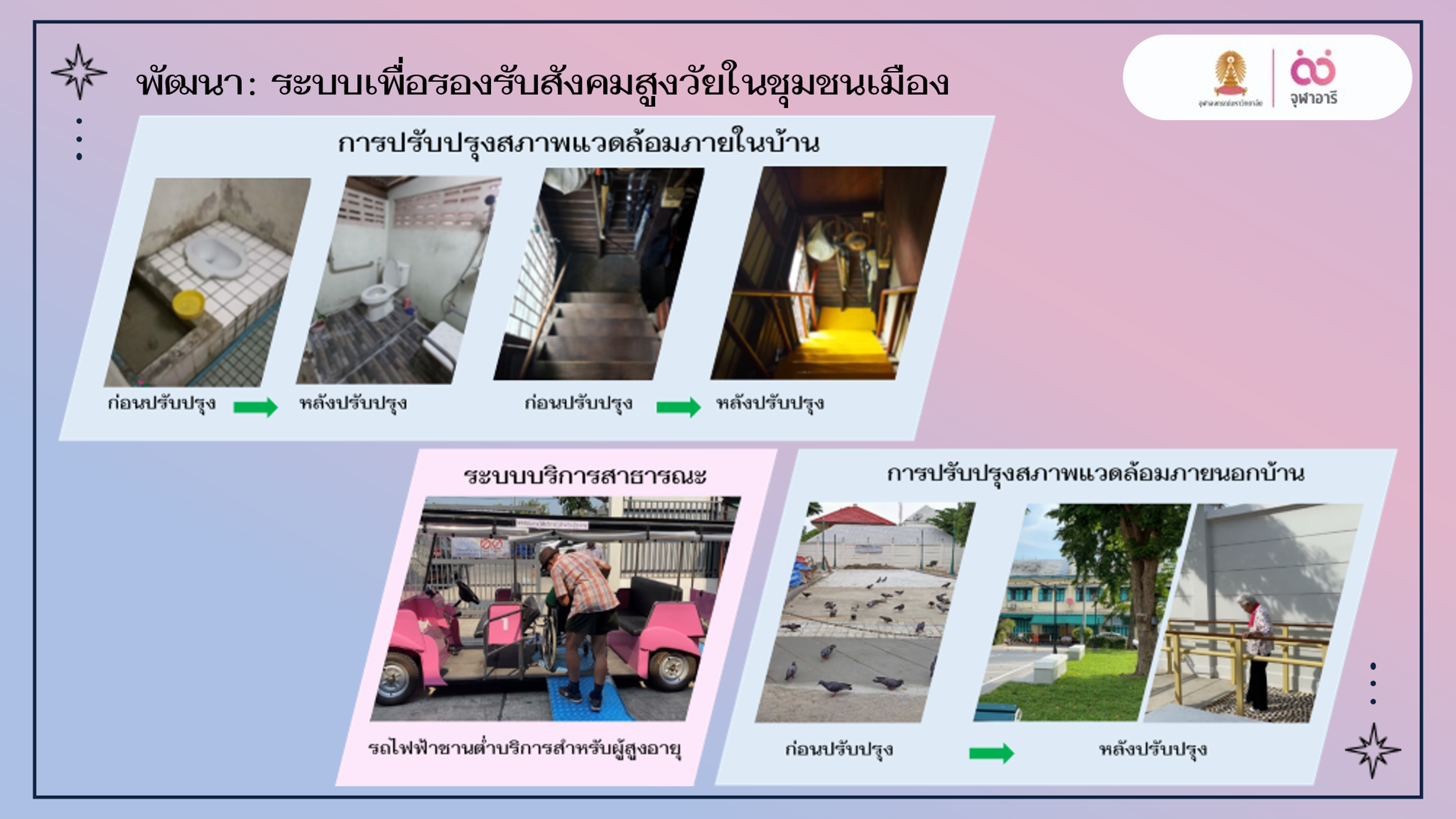
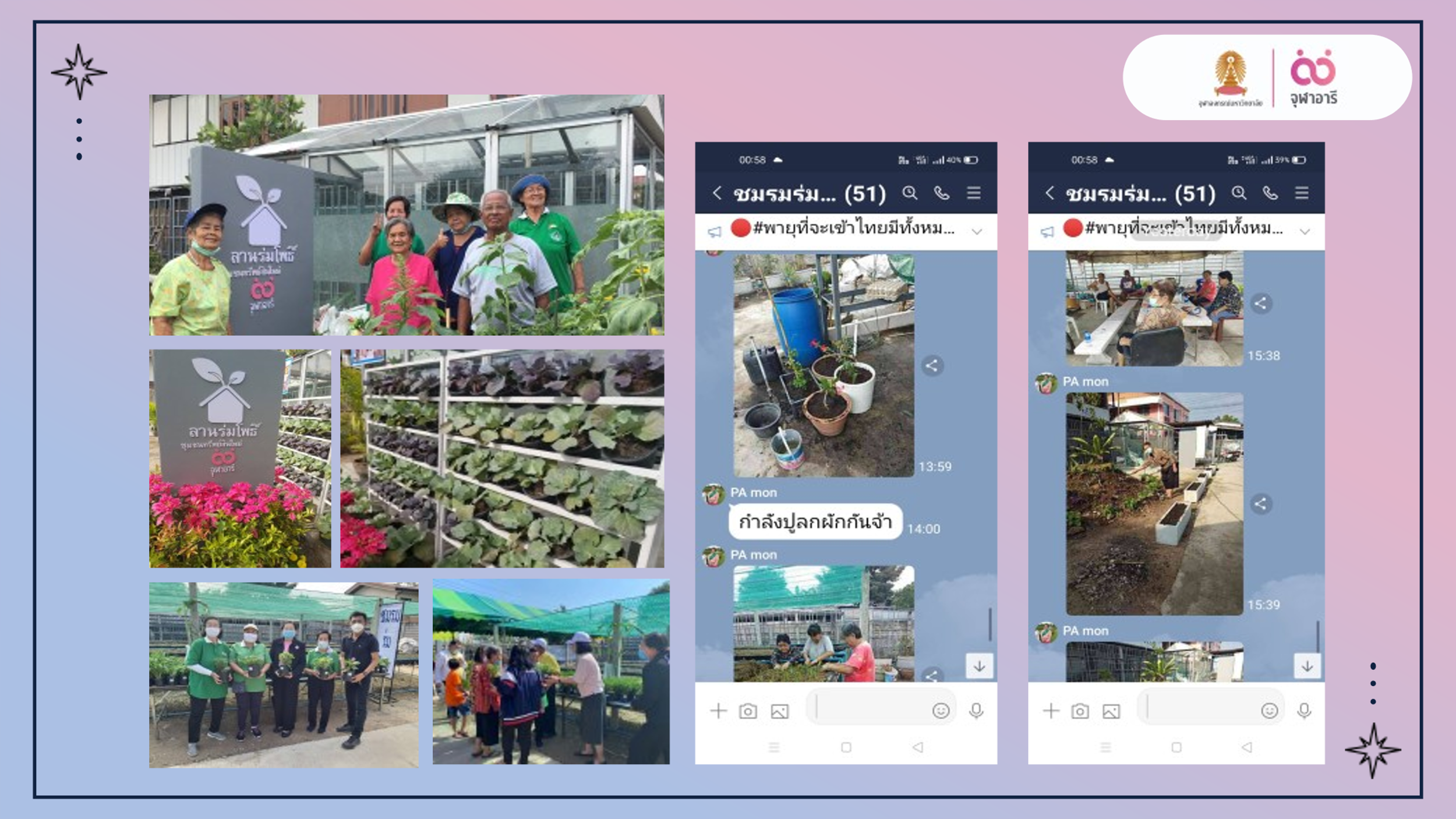
โครงการจุฬาอารี ได้นำเทคโนโลยีและนวัตกรรมมาเสริมทุกพันธกิจ โดยมีการพัฒนาหุ่นยนตร์ดูแลผู้ป่วยโรคหลอดเลือดสมองในลักษณะของโทรเวชกรรม และหุ่นยนต์เพื่อเสริมการกายภาพบำบัดเพื่อช่วยเสริมกำลังของนักกายภาพบำบัดในด้านการฟื้นฟูกำลังแขนขา ซึ่งนวัตกรรมเหล่านี้ได้นำไปใช้ในชุมชนและสถานบริการด้านสาธารณสุขและสังคม เพื่อส่งเสริมและฟื้นฟูสุขภาพ
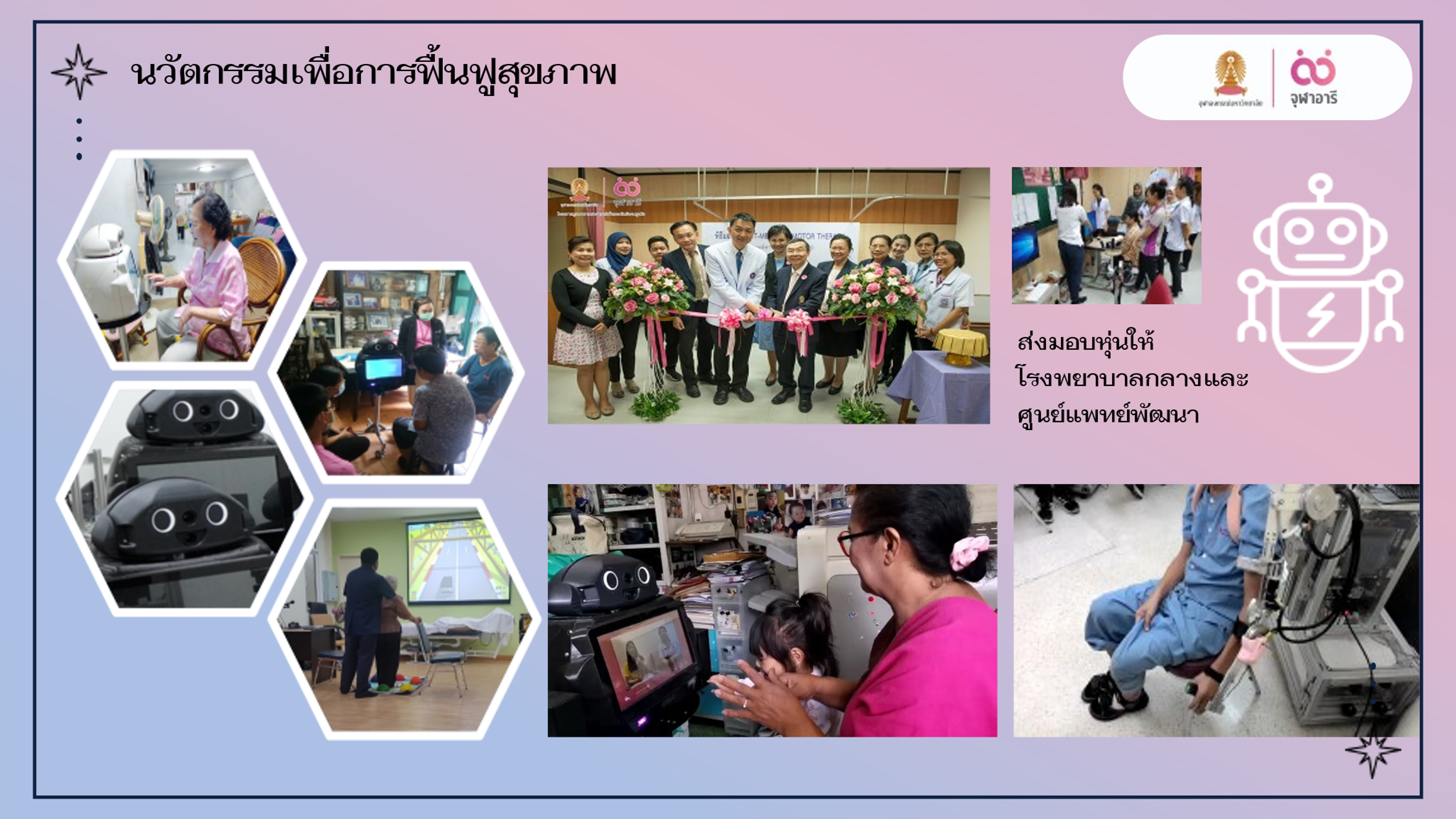
โครงการจุฬาอารี สร้างงานวิจัยที่มีผลต่อนโยบายของประเทศ ในรูปของการจัดทำแผนปฏิบัติการด้านผู้สูงอายุ ระยะที่ 3 ซึ่งเป็นแผนแม่บทรองรับสังคมสูงวัยปี 2566–2580 ที่สอดรับกับยุทธศาสตร์ชาติและแผนแม่บทภายใต้ยุทธศาสตร์ชาติ ทั้งยังเป็นกลไกสำคัญที่จะขับเคลื่อนยุทธศาสตร์ชาติให้มีผลในทางปฏิบัติอย่างเป็นรูปธรรม โดยคณะกรรมการผู้สูงอายุแหงชาติ (กผส.) เมื่อวันที่ 30 กรกฎาคม 2564 มีมติเห็นชอบแผนแผนปฏิบัติการด้านผู้สูงอายุ ระยะที่ 3 และจะนำเข้าที่ประชุมคณะรัฐมนตรี และประกาศใช้ต่อไป
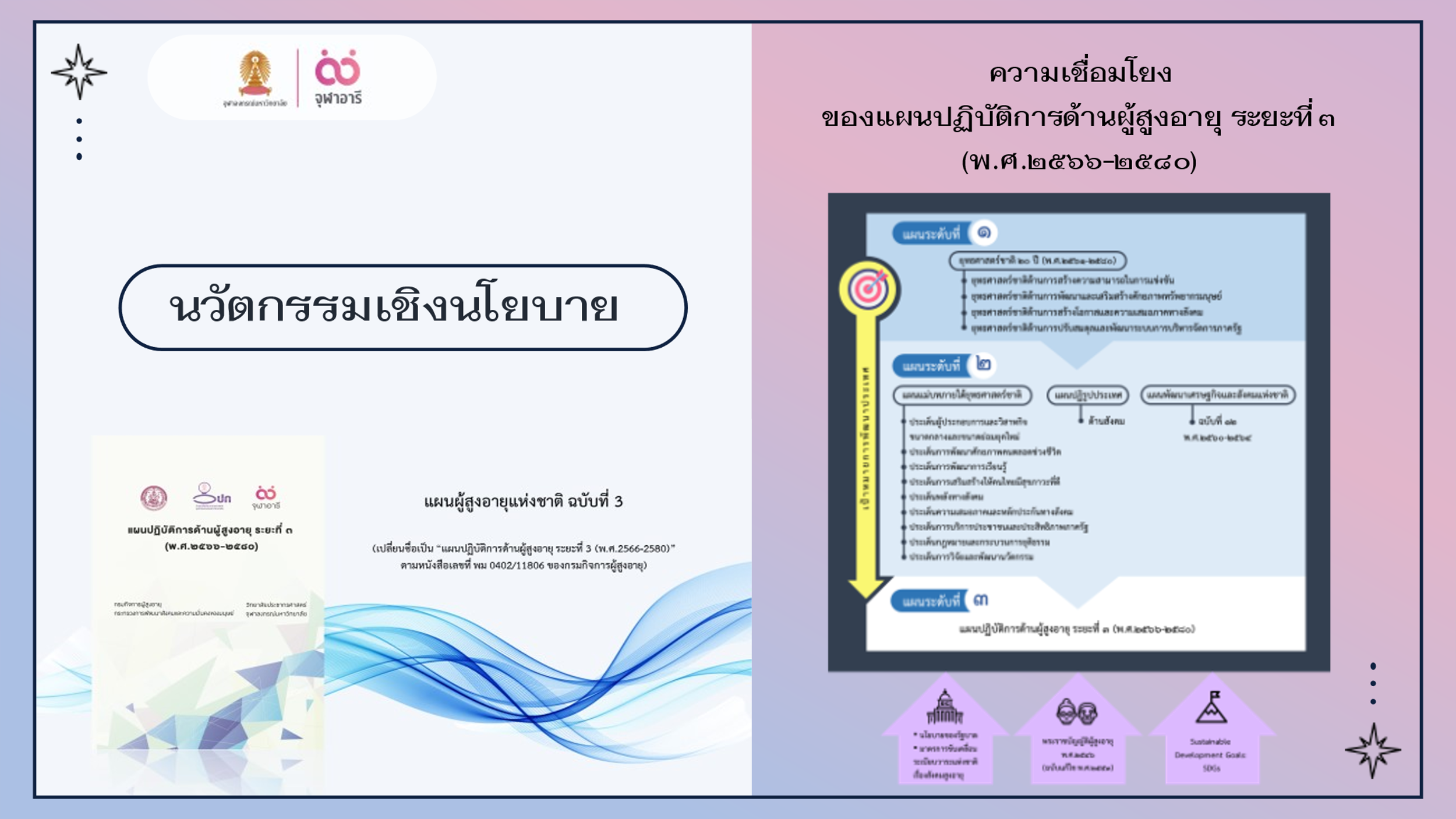
จากผลการดำเนินงานพัฒนาระบบและกลไกเพื่อรองรับสังคมสูงวัยของโครงการจุฬาอารีนี้ ทำให้จุฬาลงกรณ์มหาวิทยาลัยได้รับรางวัลผลงานการพัฒนาสังคมเป็นเลิศ ประเภทหน่วยงานที่มีผลงานด้าน CSR เป็นเลิศจากกระทรวงการพัฒนาสังคมและความมั่นคงของมนุษย์
หุ่นยนต์ฟื้นฟู ได้รับรางวัลรองชนะเลิศอันดับที่ 1 ประเภทหุ่นยนต์และซอฟแวร์เพื่อบริการทางการแพทย์และสาธารณสุข จากการประกวดหุ่นยนต์ทางการแพทย์ i-MEDBOT Innovation Contest 2021 ซึ่งจัดโดยศูนย์ความเป็นเลิศด้านชีววิทยาศาสตร์ (องค์การมหาชน) หรือ ทีเซลส์ (TCELS) กระทรวง การอุดมศึกษา วิทยาศาสตร์ วิจัยและนวัตกรรม เมื่อวันที่ 3 กันยายน 2564
ทั้งยังตอบโจทย์การพัฒนาอย่างยั่งยืน หรือ Sustainable Development Goal ขององค์การสหประชาชาติ ทั้งในมิติของ
– SDGs 1 การยุติความยากจน

– SDGs 3 การดูแลสุขภาวะ
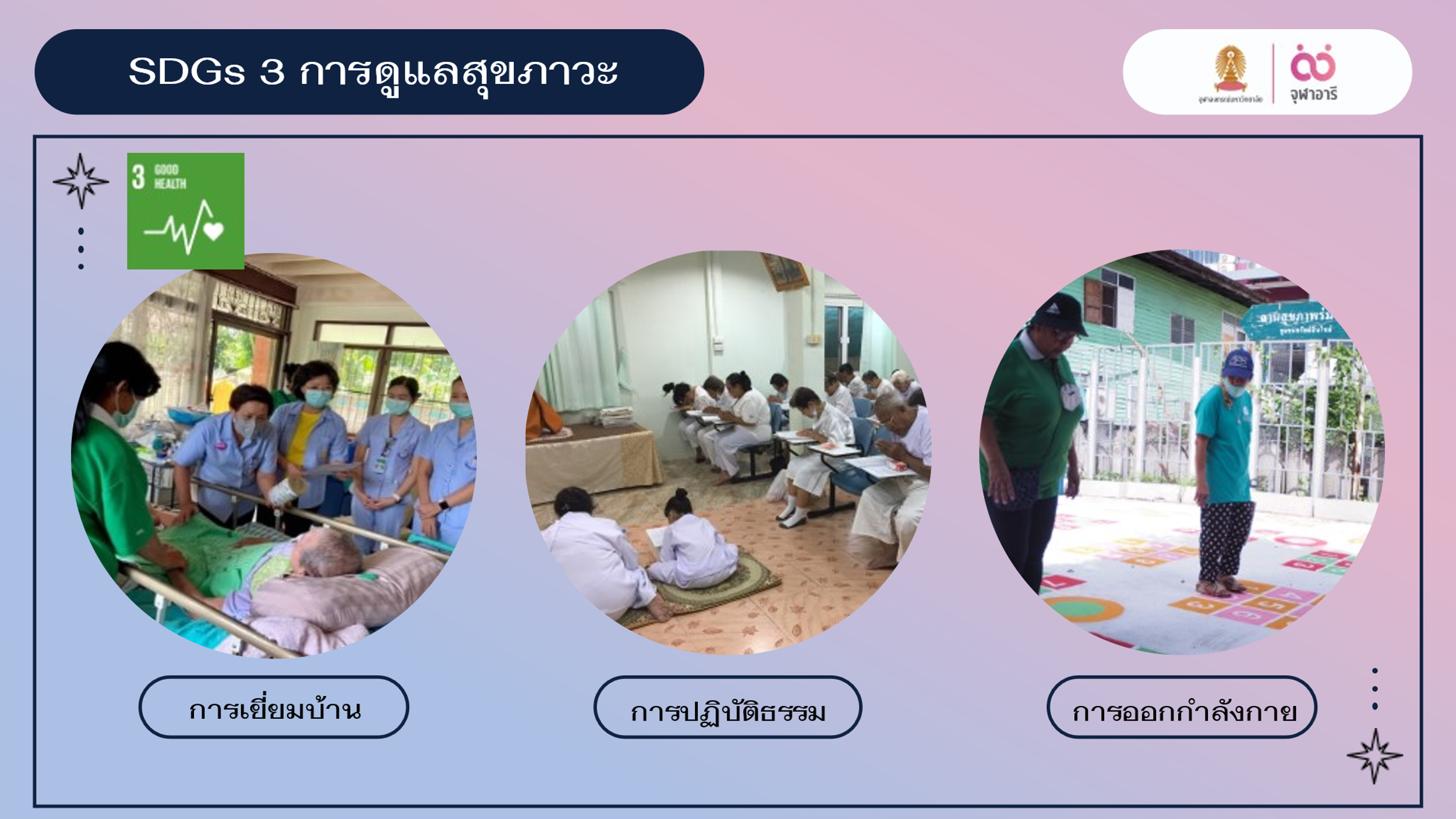
– SDGs 4 การศึกษาเรียนรู้ตลอดชีวิต
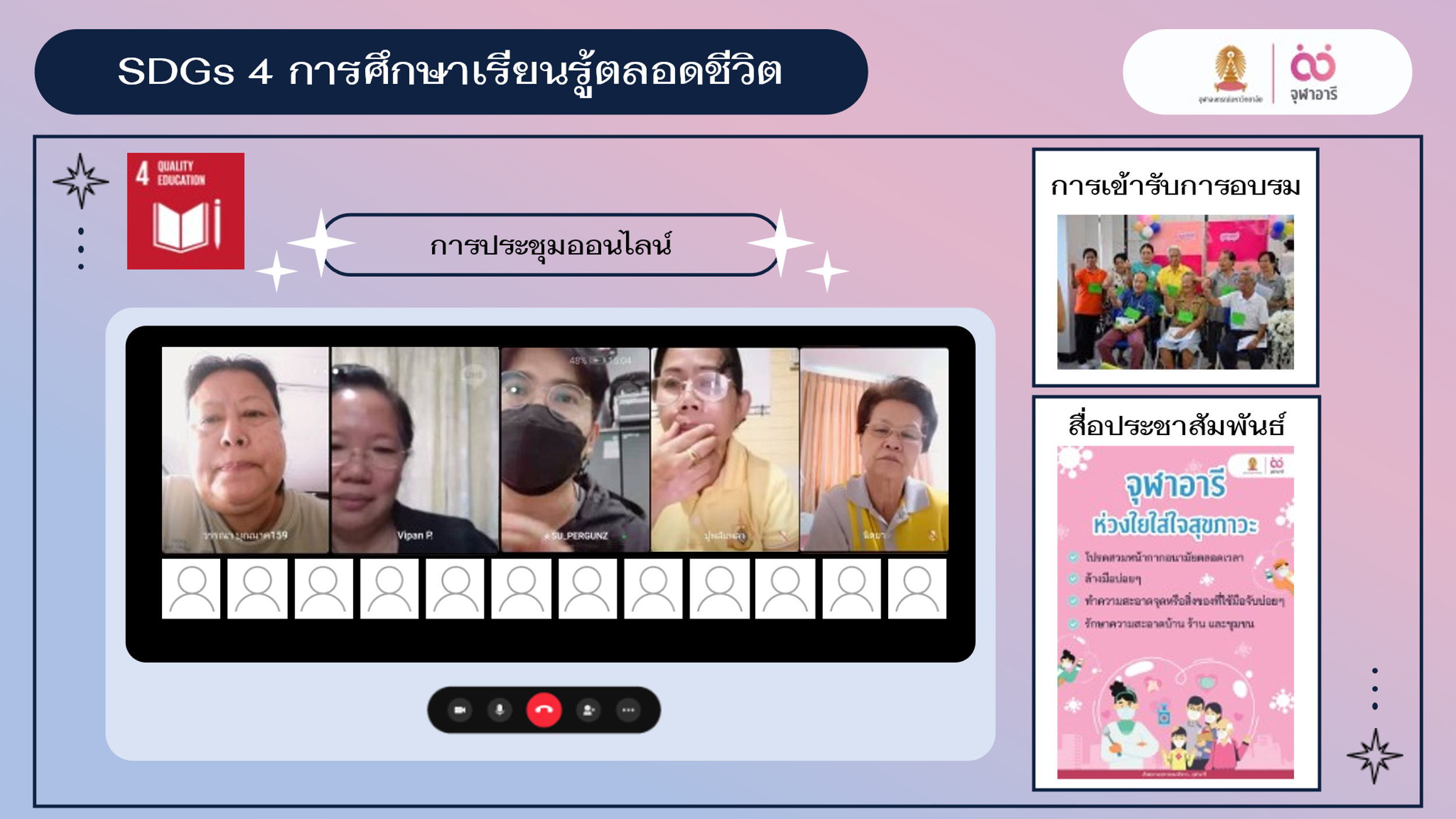
– SDGs 8 การพัฒนาอาชีพและเศรษฐกิจ
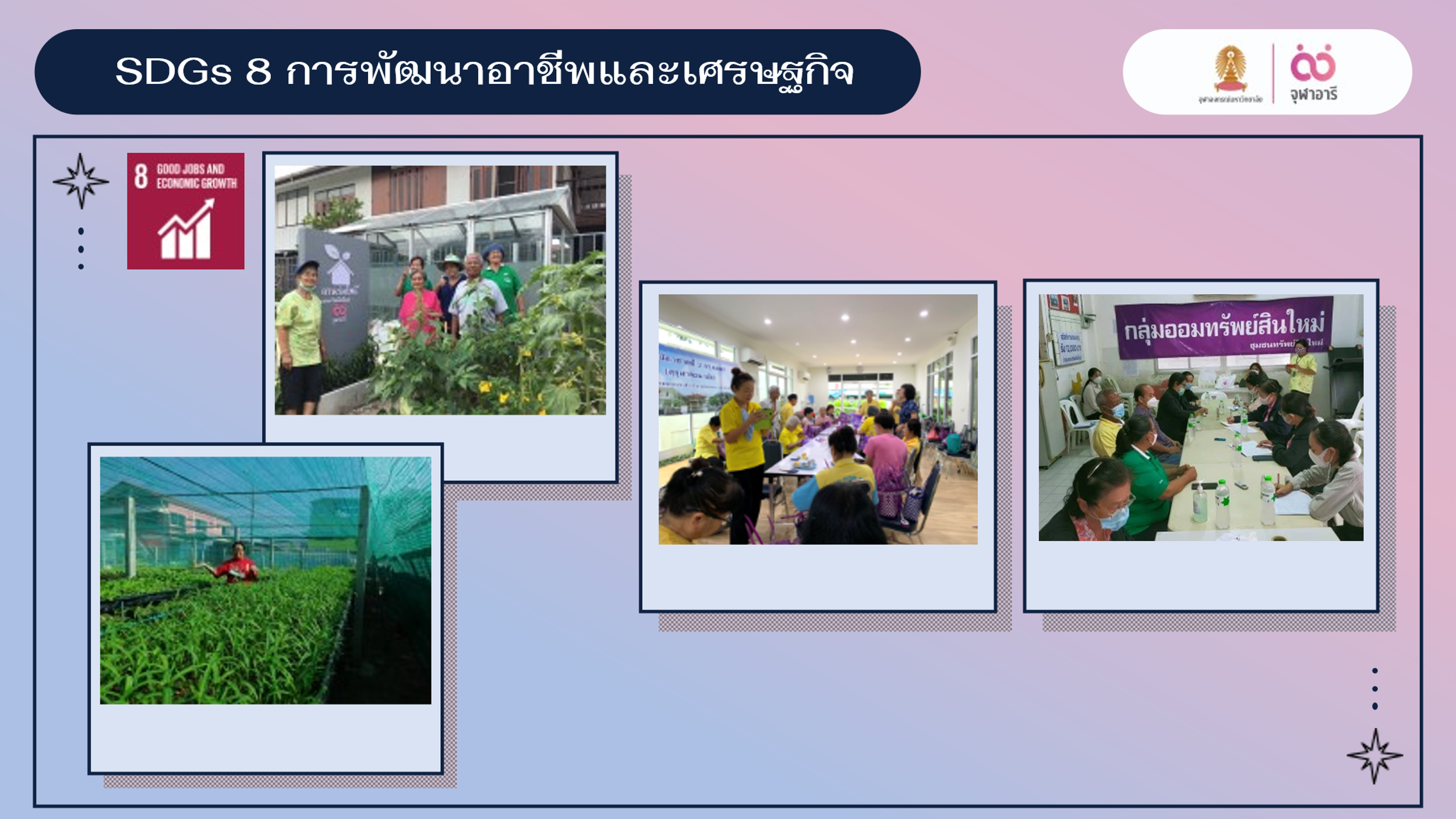
– SDGs 9 การพัฒนานวัตกรรมและโครงสร้างพื้นฐาน
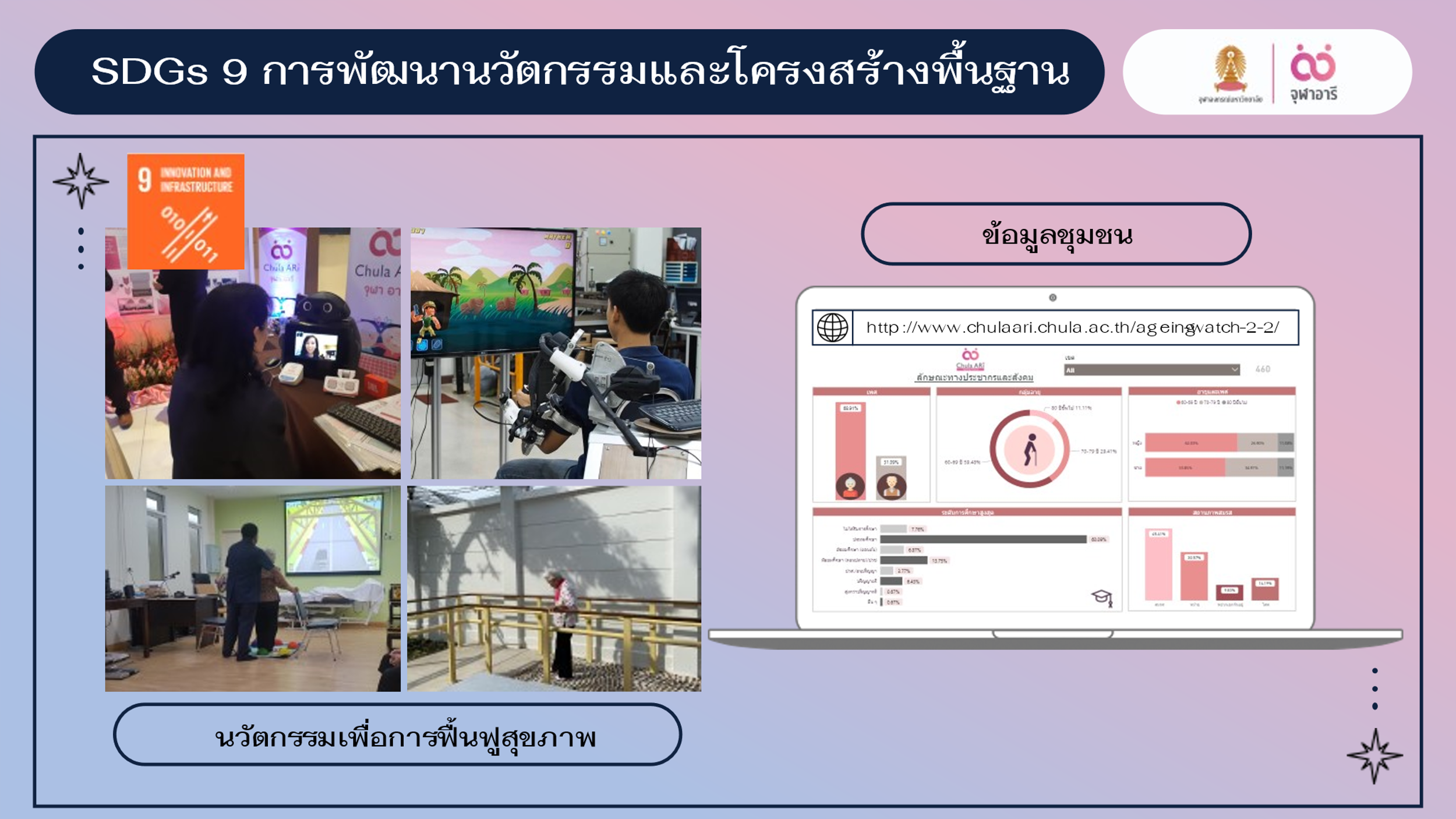
– SDGs 10 ลดความเหลื่อมล้ำ
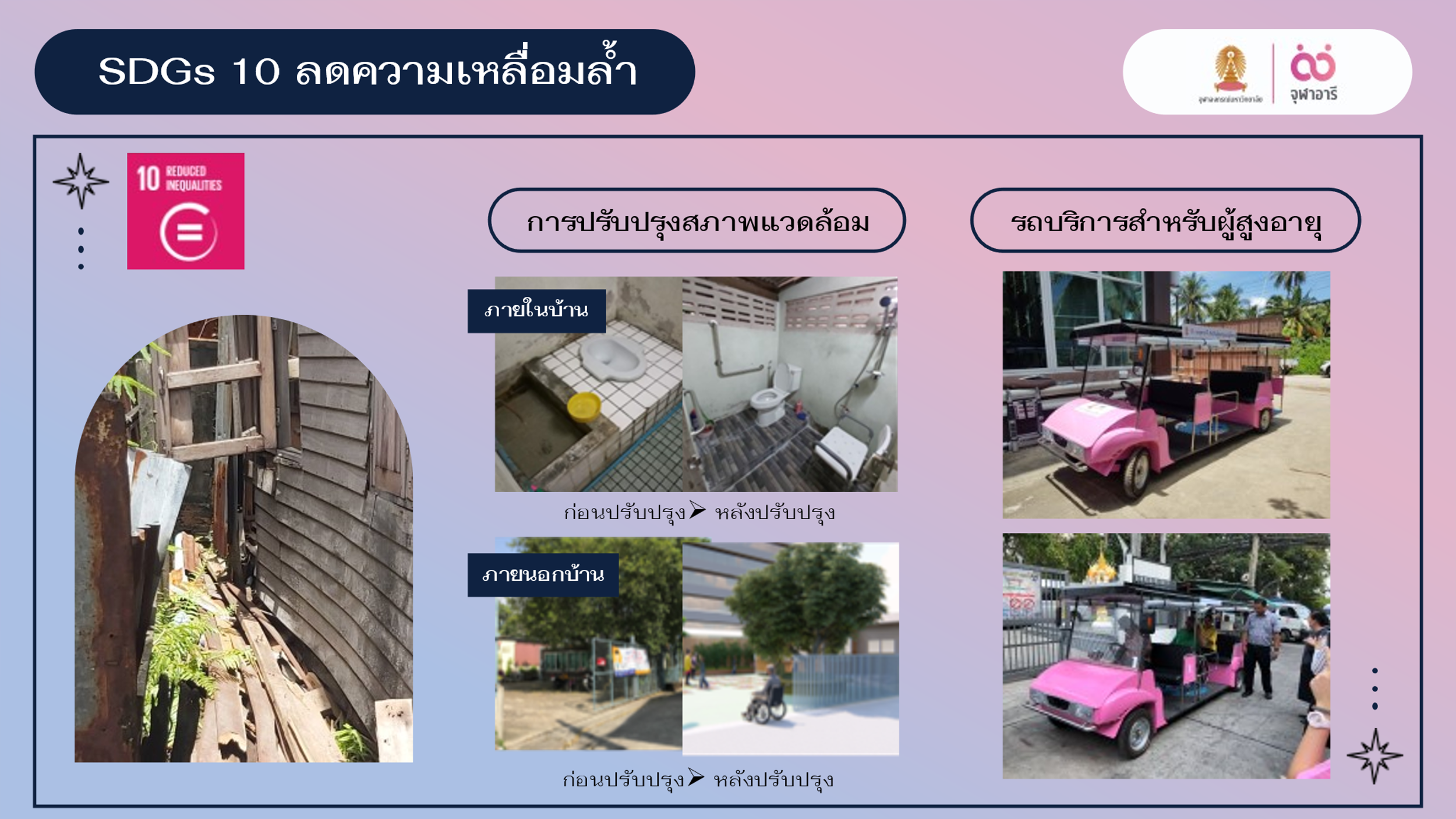
– SDGs 11 สร้างสังคมเมืองที่ยั่งยืน
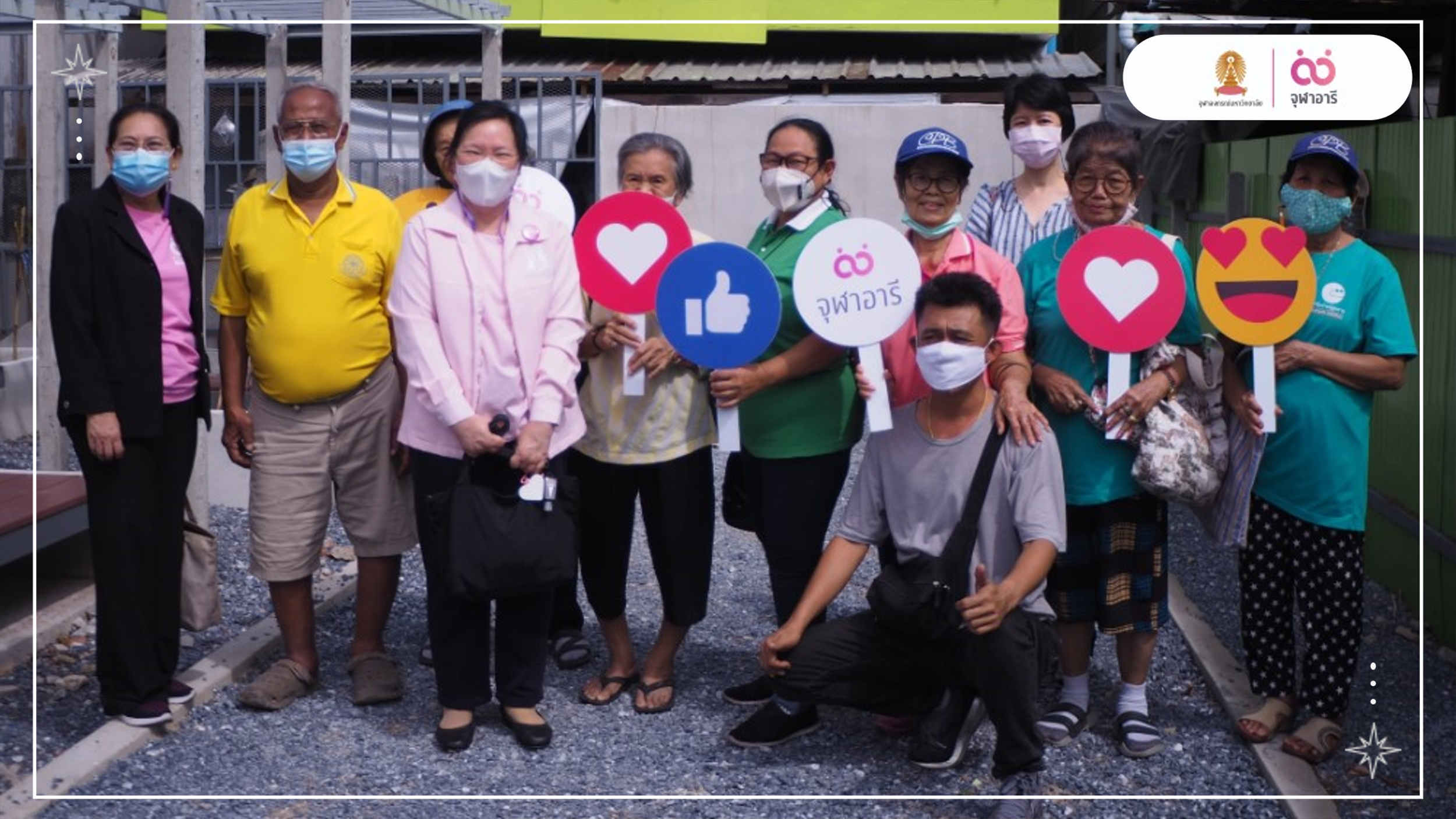
– SDGs 17 การร่วมมือผนึกกำลังเครือข่ายเพื่อบรรลุวัตถุประสงค์
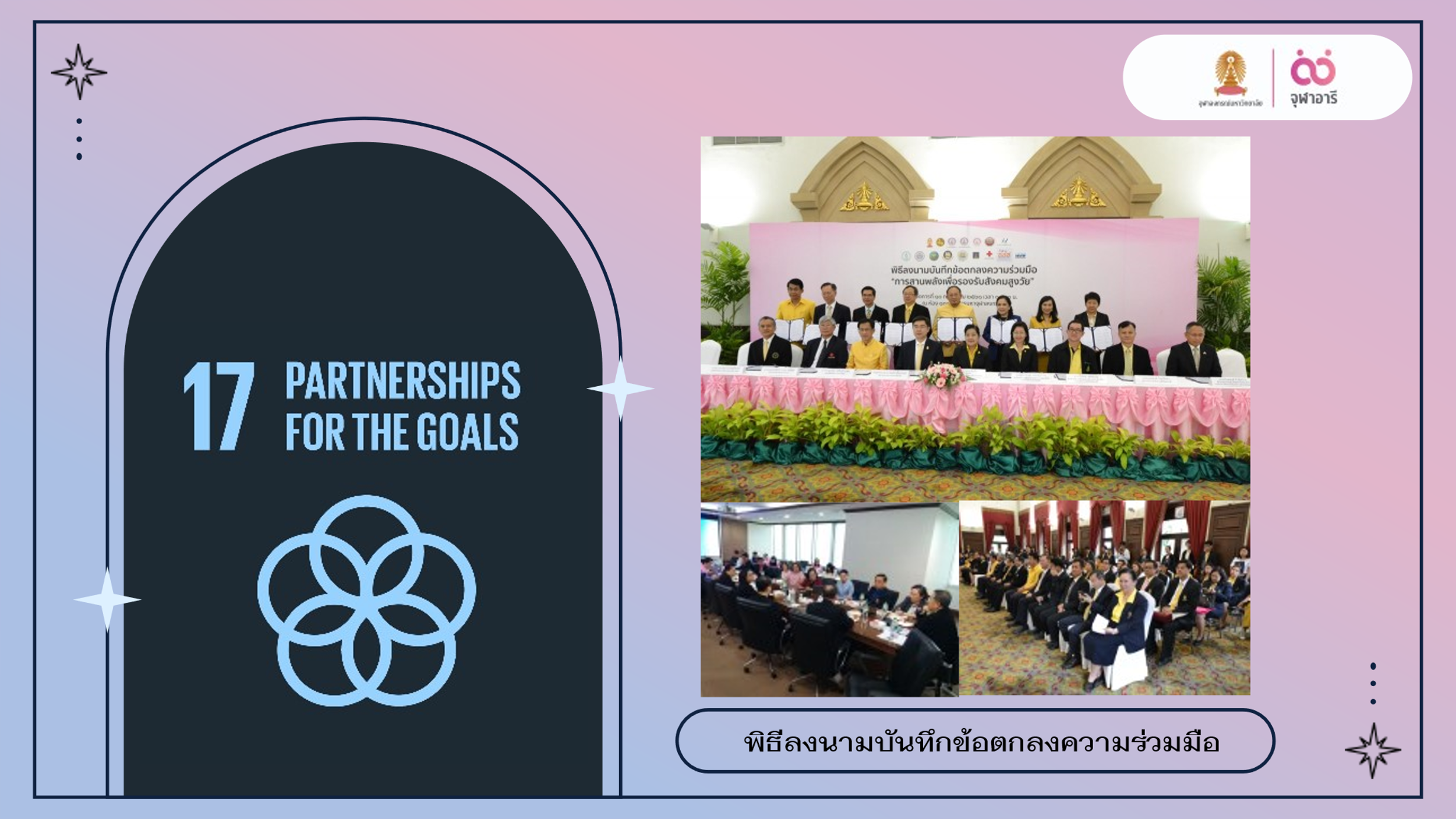
โครงการไทยอารี เป็นผลิตผลจากการต่อยอดการวิจัยเชิงปฏิบัติการ และการขยายผลต้นแบบระบบรองรับสังคมสูงวัยในเมืองมหานคร เพื่อระดมพลังสถาบันการศึกษา ชุมชน และภาคส่วนต่างๆ ในการพัฒนาคุณภาพชีวิตผู้สูงอายุไปสู่ชุมชนเมืองอื่นของประเทศ ให้เป็นชุมชนที่สร้างเสริมพลังของผู้สูงอายุและน่าอยู่สำหรับคนทุกวัย โดยมีแผนพัฒนาเพื่อรองรับสังคมผู้สูงวัยในอนาคต ได้แก่
- ด้านฐานข้อมูล Data-driven Policy ขับเคลื่อนนโยบายของรัฐ รองรับสังคมสูงวัยระดับท้องถิ่น
- ด้านสุขภาพและบริการทางการแพทย์ ส่งเสริมให้เกิดการป้องกัน ดูแล และการฟื้นฟูสุขภาพในระดับชุมชนและครัวเรือน หุ่นยนต์ดูแลสุขภาพ เพื่อติดต่อบุคลากรทางการแพทย์ได้อย่างทั่วถึงและรวดเร็ว
- ด้านเศรษฐกิจและสังคม ผลักดันมาตรการที่เหมาะสม เพิ่มโอกาสใหม่ให้กับเศรษฐกิจไทยด้วยนวัตกรรมการบริการและผลิตภัณฑ์รองรับสังคมสูงวัย หรือเปิดโอกาสให้ผู้สูงอายุได้ทำงาน โดยใช้หลักการ ‘Universal Design’ ออกแบบให้เป็นมิตรต่อผู้สูงอายุและผู้คนทุกช่วงวัย ในเขตเมืองของภูมิภาคต่าง ๆ
- ด้านการศึกษา เพื่อให้สังคมไทยตระหนักและเตรียมการรองรับนวัตกรรมการเรียนรู้ต่อเนื่องตลอดชีวิต (Life Long Learning)
โครงการไทยอารี จึงมุ่งขับเคลื่อนบทบาทของความร่วมมือในระหว่างมหาวิทยาลัยในการสร้างสรรค์และขับเคลื่อนงานวิจัยไปสู่นโยบายและการปฏิบัติให้เกิดผลลัพธ์อย่างเป็นรูปธรรม โดยโครงการมุ่งที่จะให้เกิดต้นแบบระบบรองรับการสูงวัยในถิ่นที่สอดคล้องกับบริบทของแต่ละภูมิภาค ระบบสารสนเทศเพื่อการเรียนรู้ต่อเนื่องตลอดชีวิต คนรุ่นใหม่มีการเตรียมความพร้อมพร้อมเพื่อเป็นผู้สูงอายุที่มีคุณภาพ และมีการพัฒนาเศรษฐกิจและนวัตกรรมที่สามารถส่งเสริมความมั่นคงในชีวิตของผู้สูงอายุ โดยมีเป้าหมายสุดท้ายคือความยั่งยืนของระบบที่ชุมชนหรือท้องถิ่นสามารถดำเนินการด้วยตนเองโดยมีมหาวิทยาลัยในภูมิภาคให้การสนับสนุน
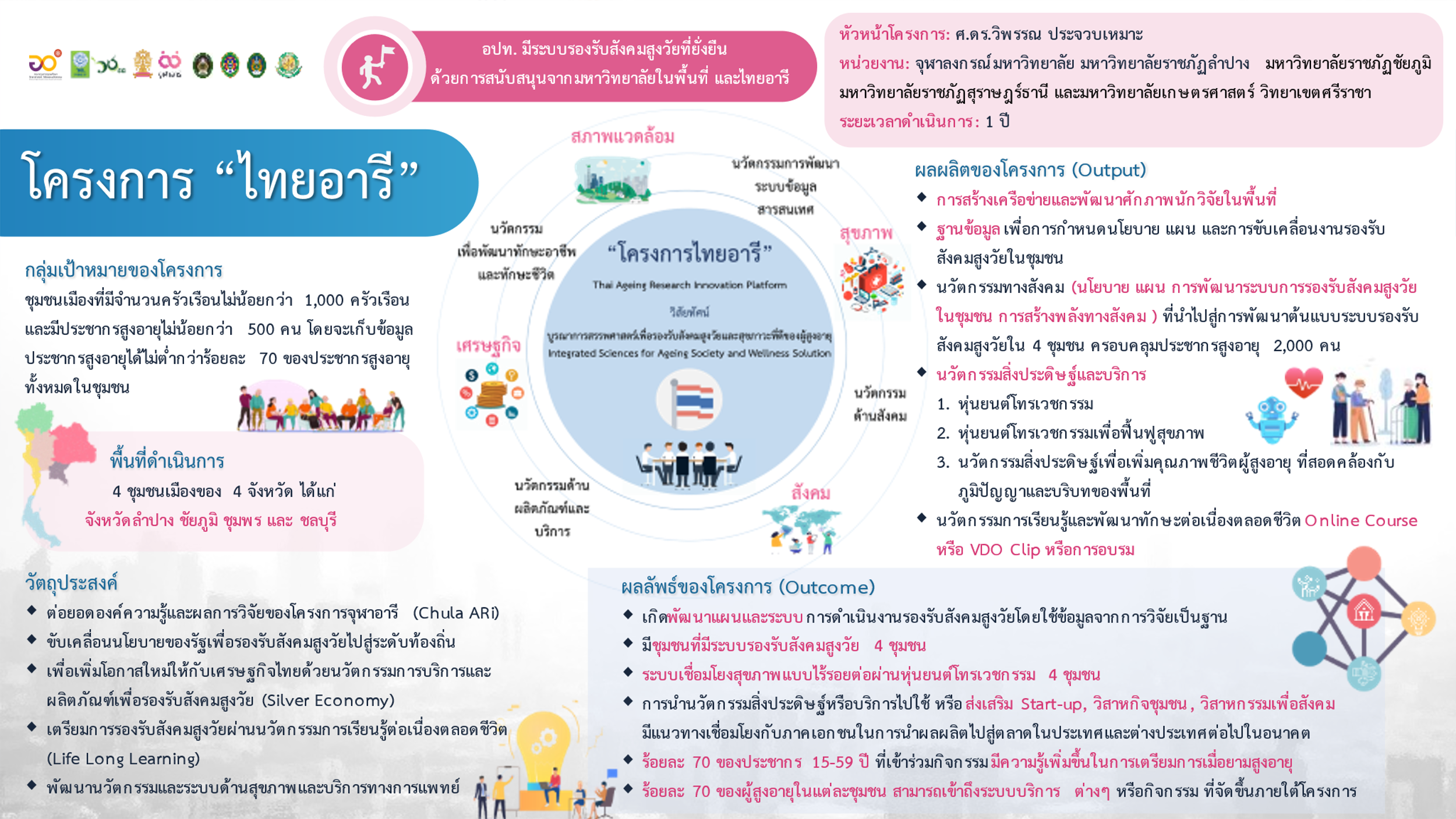
Chula ARi and SDGs
As the world enters the 21st century, it also celebrates humanity’s success in living significantly longer, and thus making the world’s population an ageing society. However, with success comes challenges. The rapid transformation for a developing country such as Thailand has become an issue that affects the quality of life of the population and sustainable development of the country.
Chulalongkorn University, an internationally recognized national institution, has the capability to develop and guide Thailand in tackling the challenging conundrum of an ageing society. This is achieved through combining knowledge and wisdom from diverse fields possessed by the University, namely physical and biological sciences, social sciences and humanities. In addition, the University acts as a center, joining forces with various partners within and outside the University, namely local communities, as well as national and international organizations, to deal with the challenges of the ageing society under the Chulalongkorn Ageing Research Innovation or known in short as Chula ARi.
Chula ARi is a research and innovation platform supported by the Second Century Fund of Chulalongkorn University. The direction and goal of Chula ARi are to integrate the interdisciplinary aspects of the older persons with research and proactive academic services to develop research knowledge and innovation, leading to policy making for the development of tools and their mechanisms to support older persons’ quality of life. This also includes but not limited to older persons’ participation and economic conditions, population, society, health, environmental impact, technology and innovation.
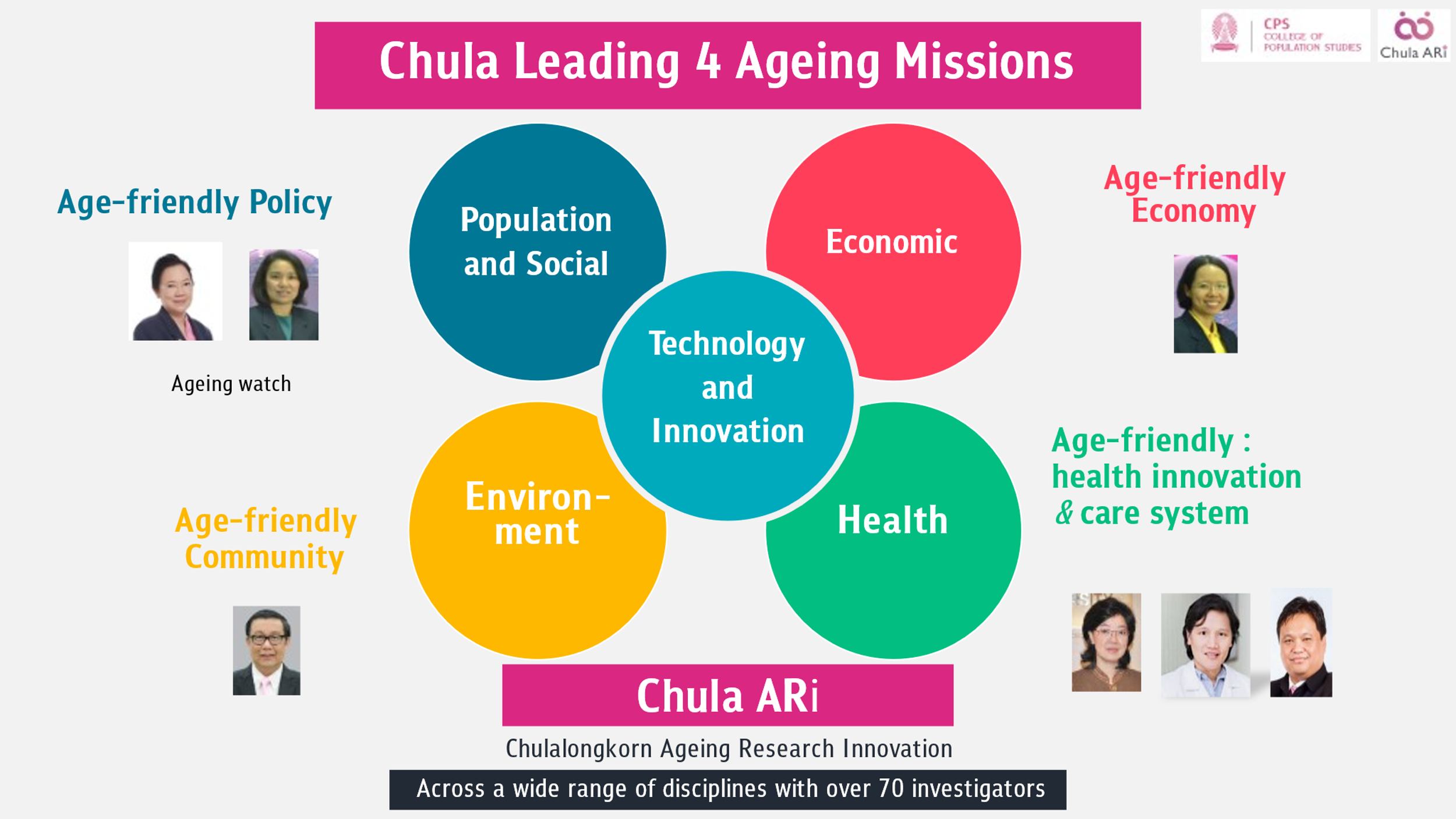
Chula ARi recognizes the importance of database development in order to continue to improve the quality of life of the older persons in all dimensions. By setting up a foundational system and database on the older persons, from data collection to presentation of information through an application, and from the development of the database system, it has evolved to surveillance on the older persons, known as Ageing Watch. The Watch surveys and monitors situations related to the older persons, including enhancing knowledge to reduce risks and increasing the quality of life of the older persons and disseminating information and knowledge to the public.
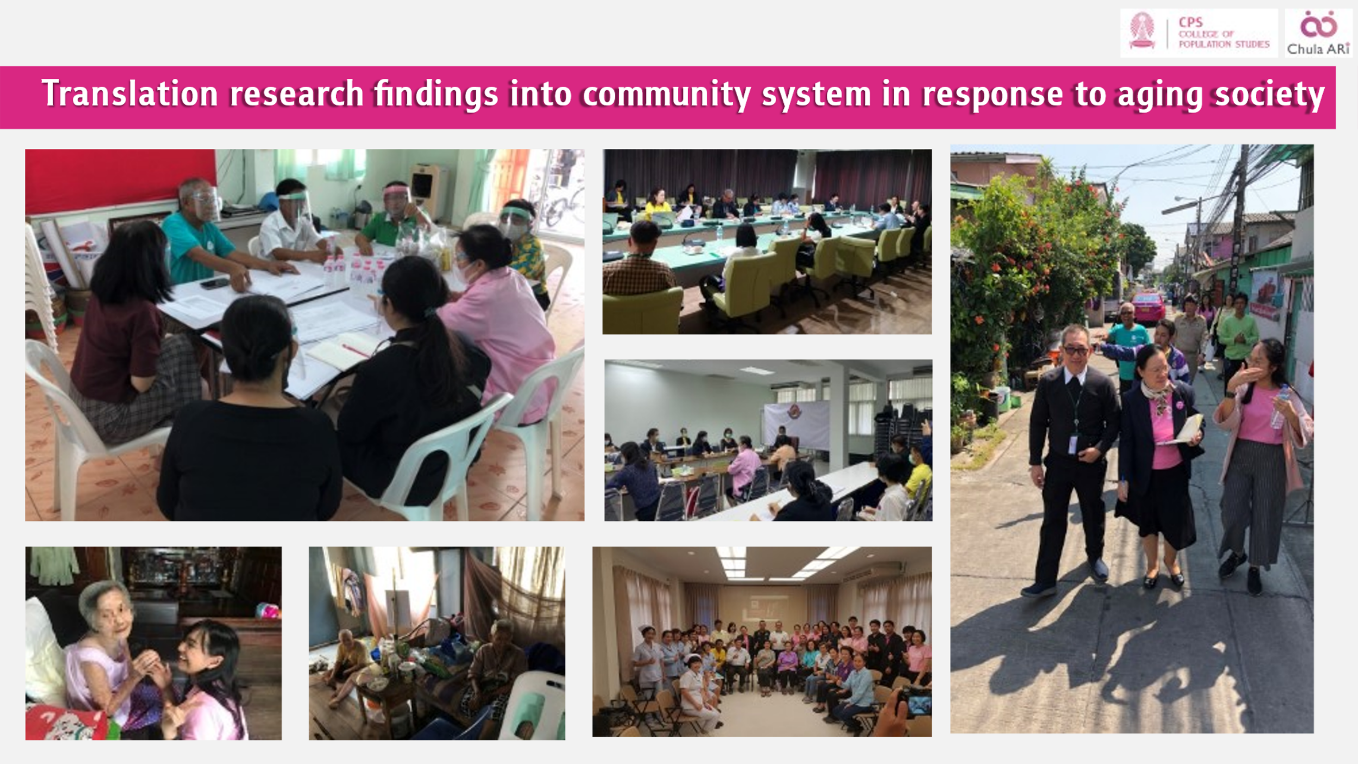
Translating research into prototype system for older persons in Bangkok is a heart of Chula ARi. We employ research findings as fundamental information for understanding the need of community and older persons. Then we share the findings with all stakeholders and community leader. Finally, we bring all thinking power of all stakeholders to seek the suitable and holistic system in response to ageing society in each urban community settings.
On the economic front, Chula ARi also recognizes challenges faced by both the older persons and those about to enter old age in urban areas. As increasing age is an obstacle to income generation and with increased expenditure, Chula ARi has set up a social security system, as well as promoting savings and organizing seminars on income generation.
Healthwise, Chula ARi has installed ‘humanitude’ care and intense home care which cater to both bed-bound and general older persons. The program also provides additional knowledge to older persons and their caregivers through multiple sources. The knowledge provided includes nutrition, physical education, oral health care, proactive physical and mental checks for the older persons in the area and surveillance of the Covid-19 situation in the community. The program also plans for potential Covid-19 crisis, empowering the community for self-maintenance and providing support in terms of consumer products.
Chula ARi also piloted changes in housing design to suit the older persons’ physical conditions so they may live safely both inside and outside their homes. This also includes the restructuring of travel system to heighten their safety and ease, to enhance their quality of life and to stabilize food provision in times of crisis.
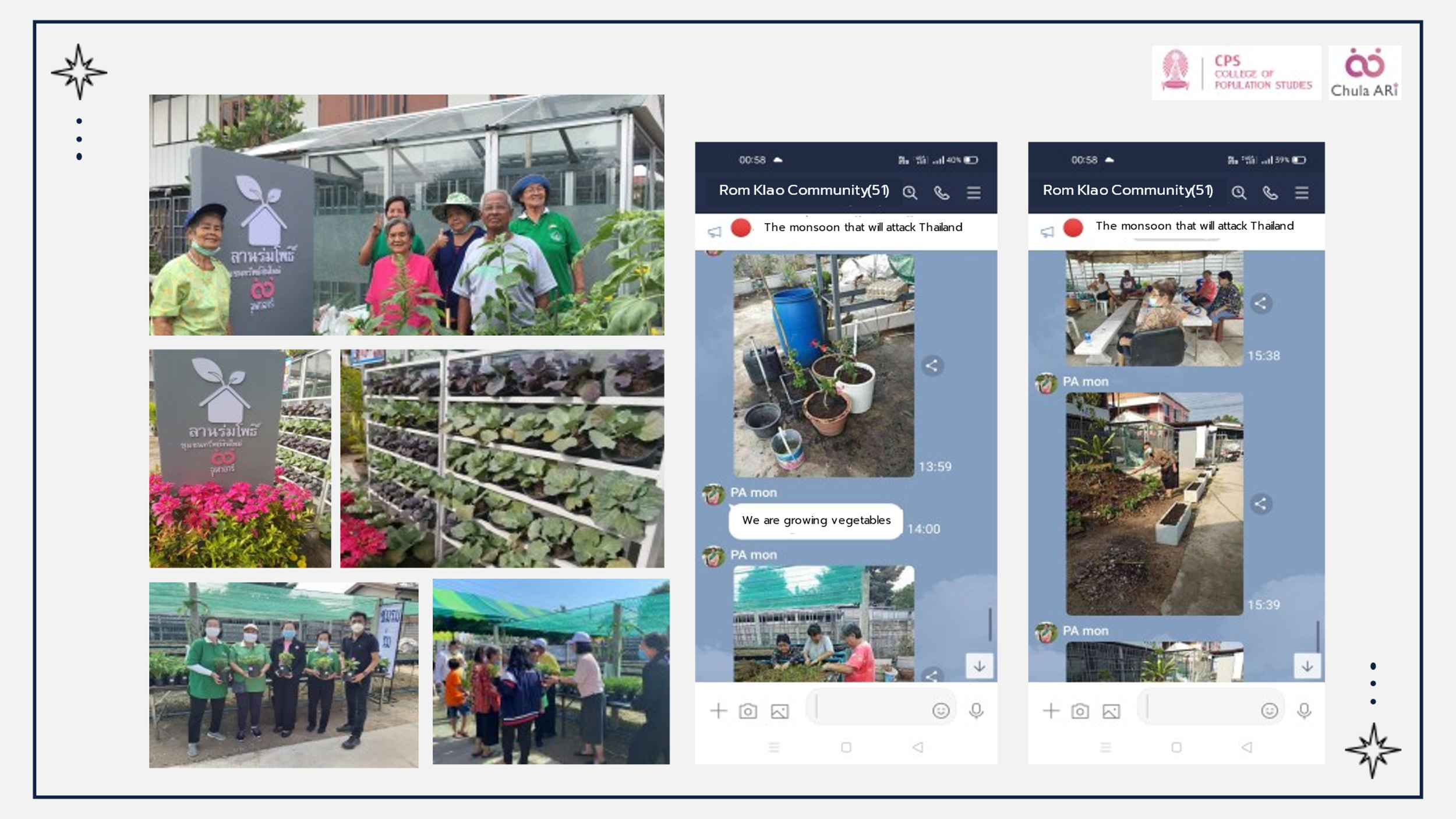
Given advances in innovation and technology, Chula ARi has developed robots to care for stroke patients, with additional utilization of telemedicine to enhance physical therapy and assist physiotherapists to revitalize the use of patients’ limbs. These innovations are being used in communities and public services to promote and restore health to the general public.
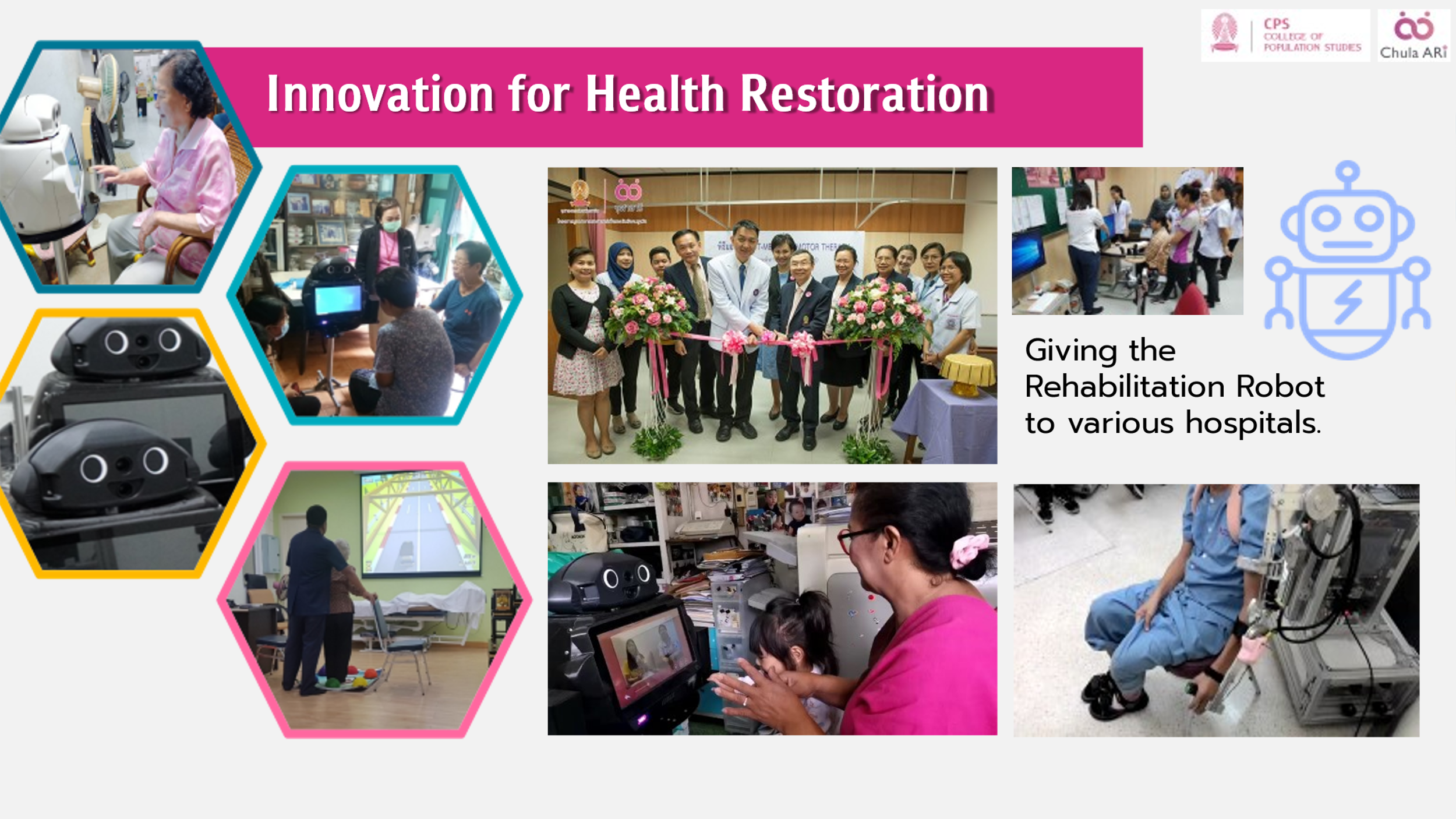
Chula ARi creates research that impact national policies in the form of the Action Plan on the Older Persons, Phase 3, which is a master plan for the ageing society from 2023 to 2037. This is in accordance with the national strategy and is also an important mechanism in driving the national strategy into concrete and practical results by the National Commission on Older Persons. On July 30, 2021 the Commission passed a resolution, approving the Action Plan for the Older Persons, Phase 3 and will be brought to the Cabinet meeting and be promulgated.
From the results of the development of systems and mechanisms by Chula ARi to support the ageing society, Chulalongkorn University received an award for excellence in social development in the category of agency with excellent CSR performance from the Ministry of Social Development and Human Security.
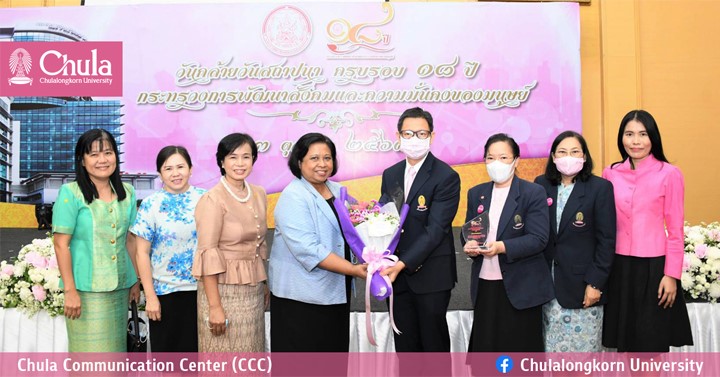
The rehabilitation robot received the second prize in the category of robotics and software for medical and public health services from the medical robotics contest (i-MEDBOT Innovation Contest 2021), organized by the Center of Excellence for Biology (a public sector) or known as TCELS, the Ministry of Higher Education, Science, Research and Innovation on September 3, 2021.
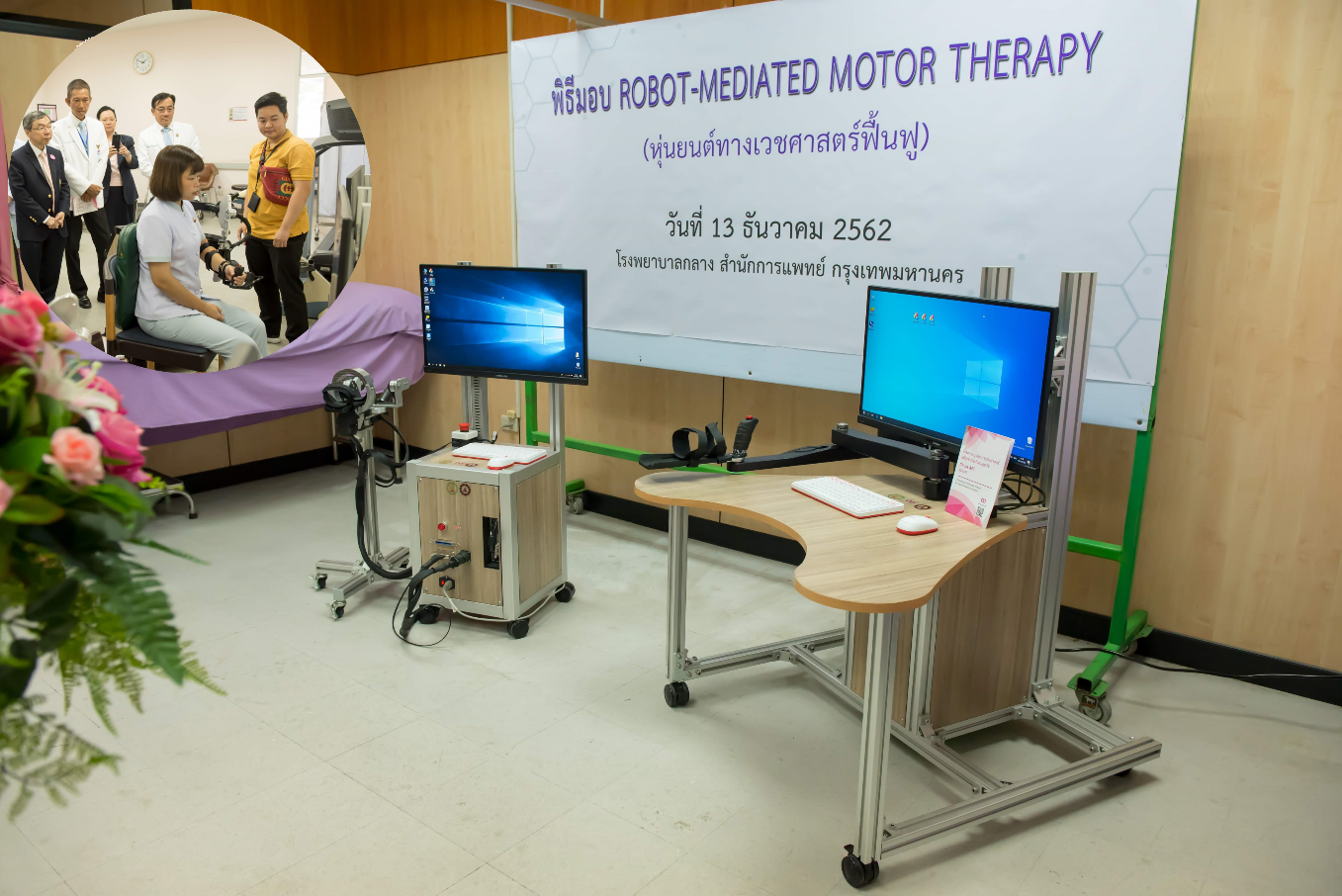
Chula ARi also responds to the sustainable development proposed by the United Nations on:
SDGs 1: Poverty elimination,
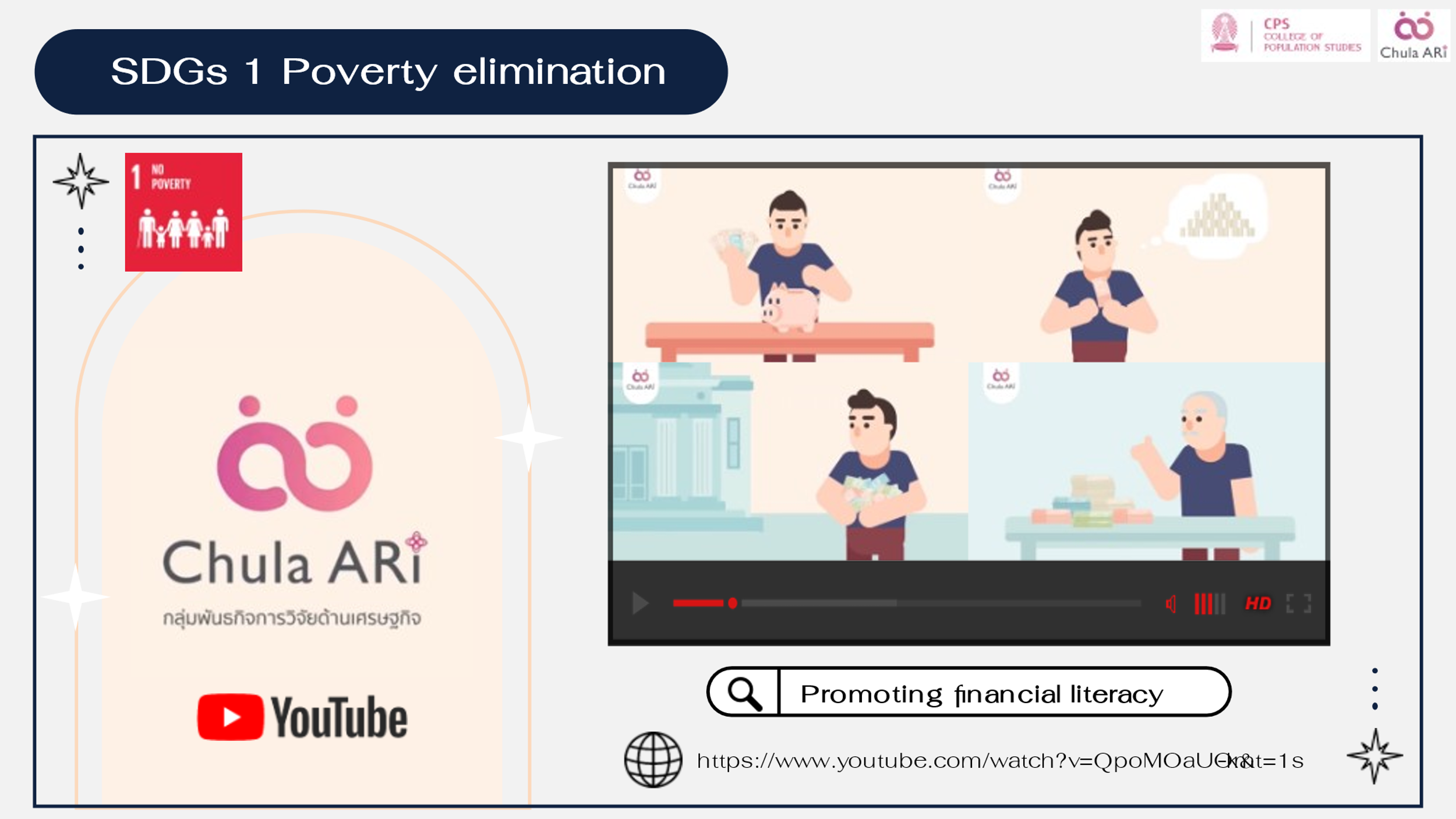
SDGs 3: Ensuring healthy life,
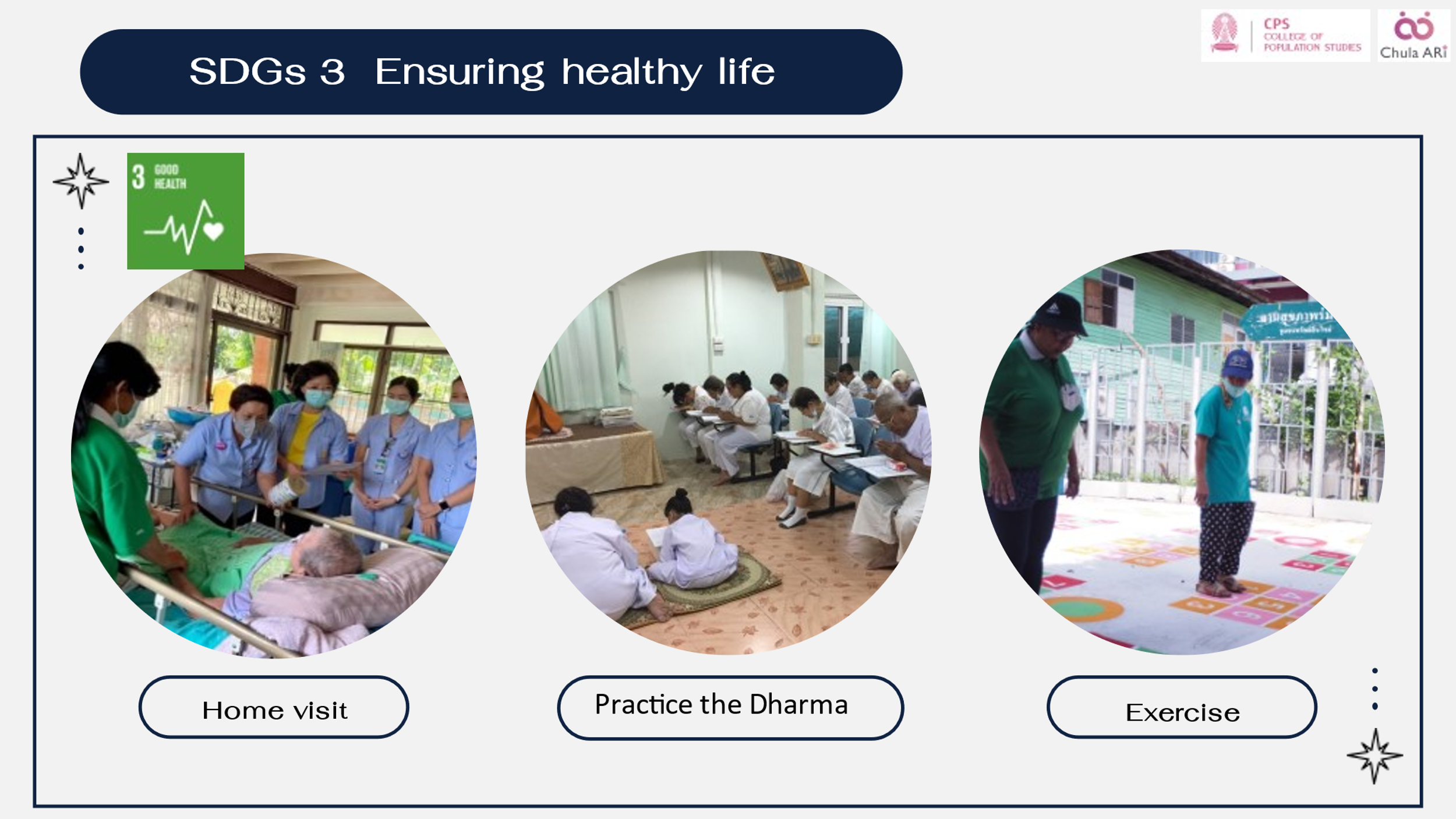
SDGs 4: Promoting life-long learning,
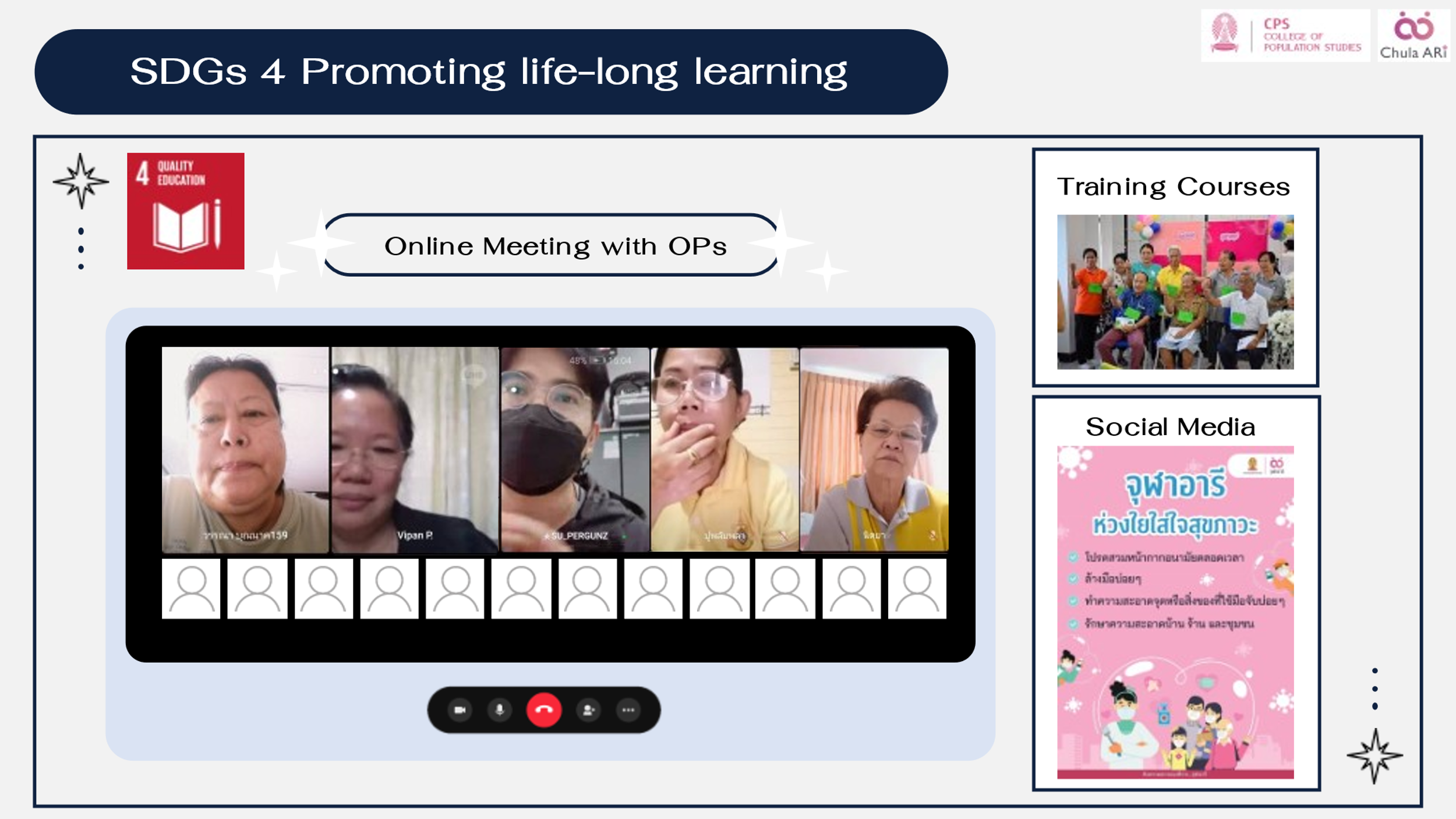
SDGs 8: Career and economic development,
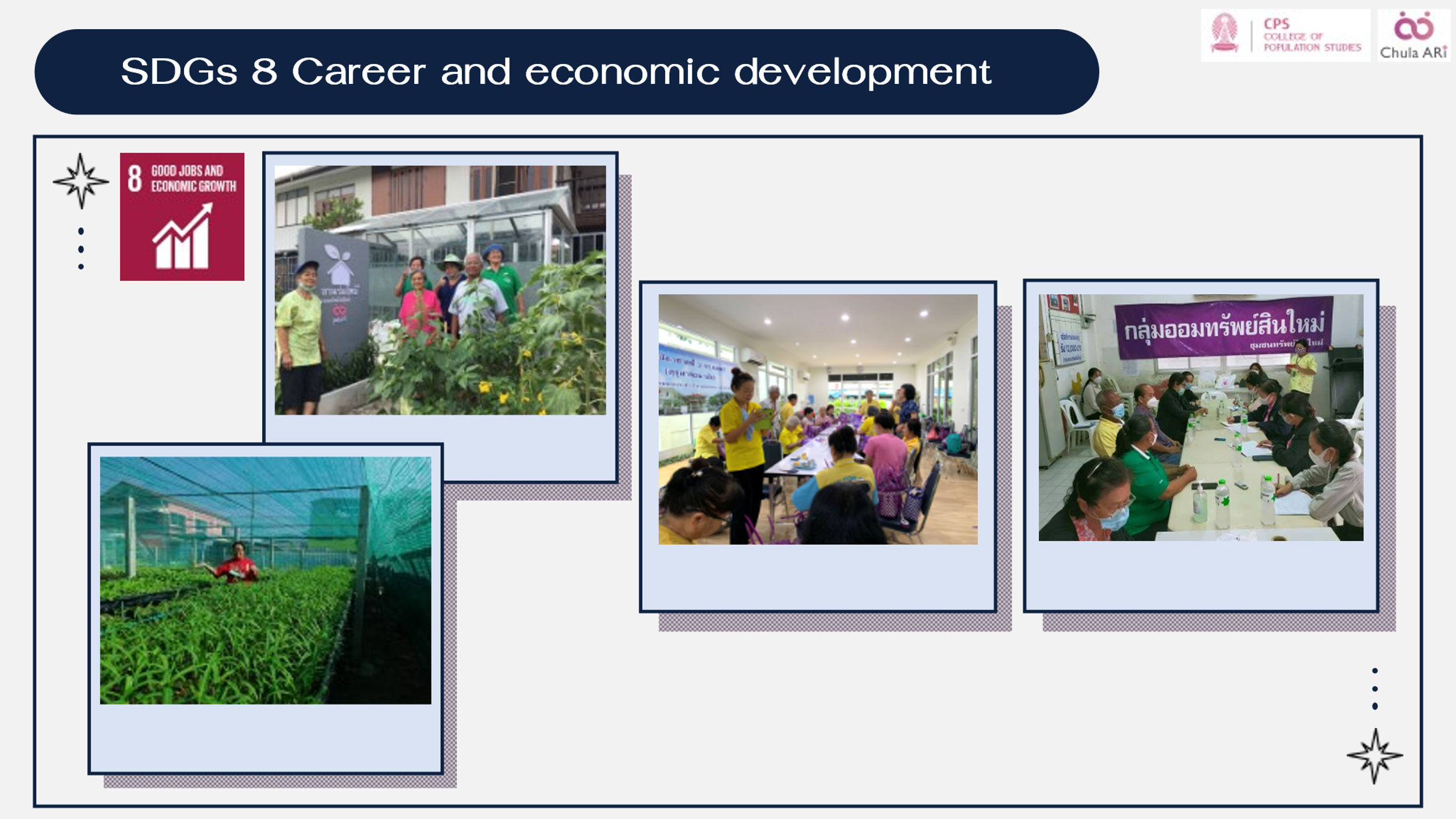
SDGs 9: Innovation and infrastructure development,
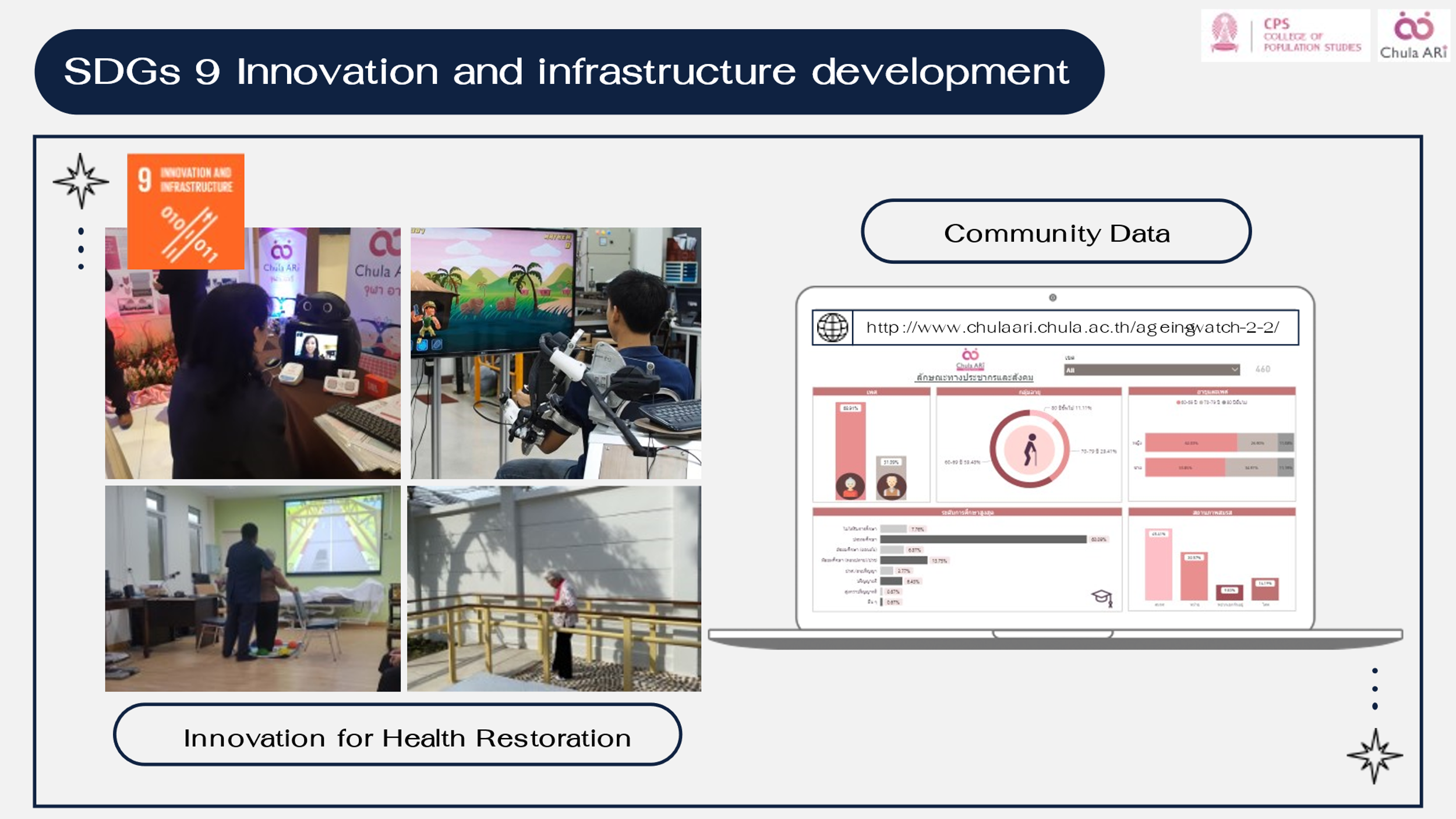
SDGs 10: Reducing inequality,
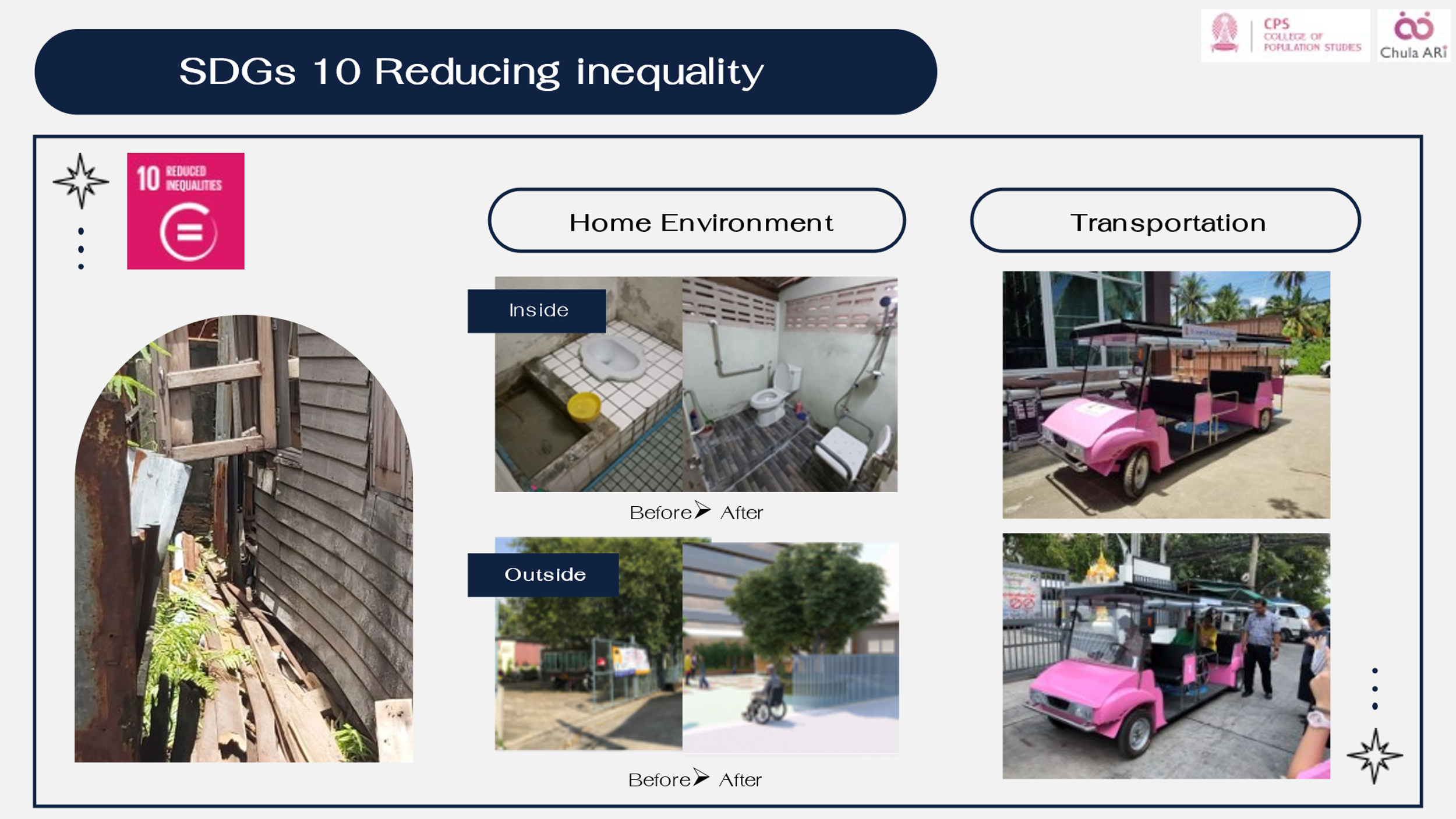
SDGs 11: Creating sustainable urban society,
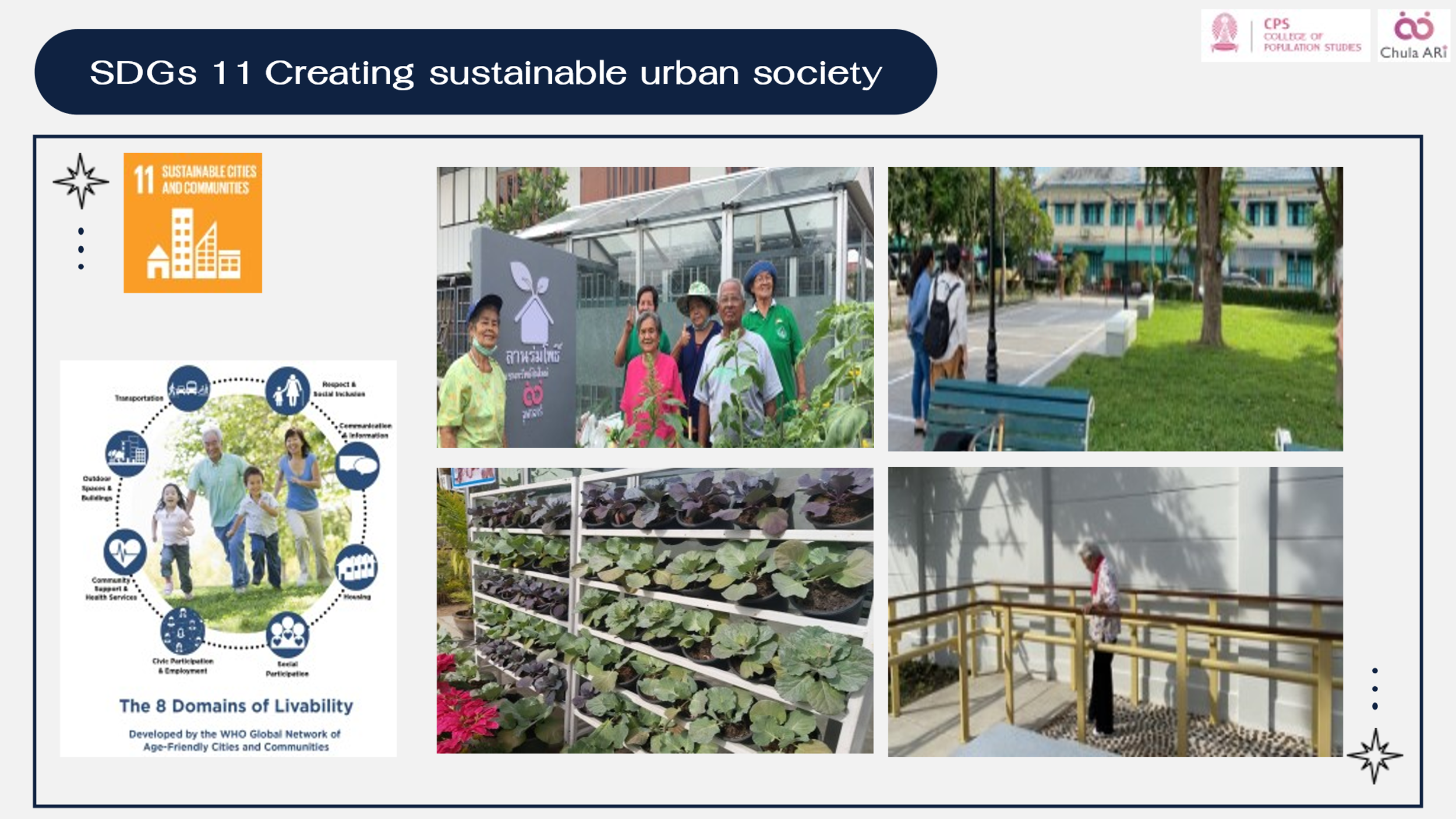
SDGs 17: Creating co-operative network to achieve said objectives.
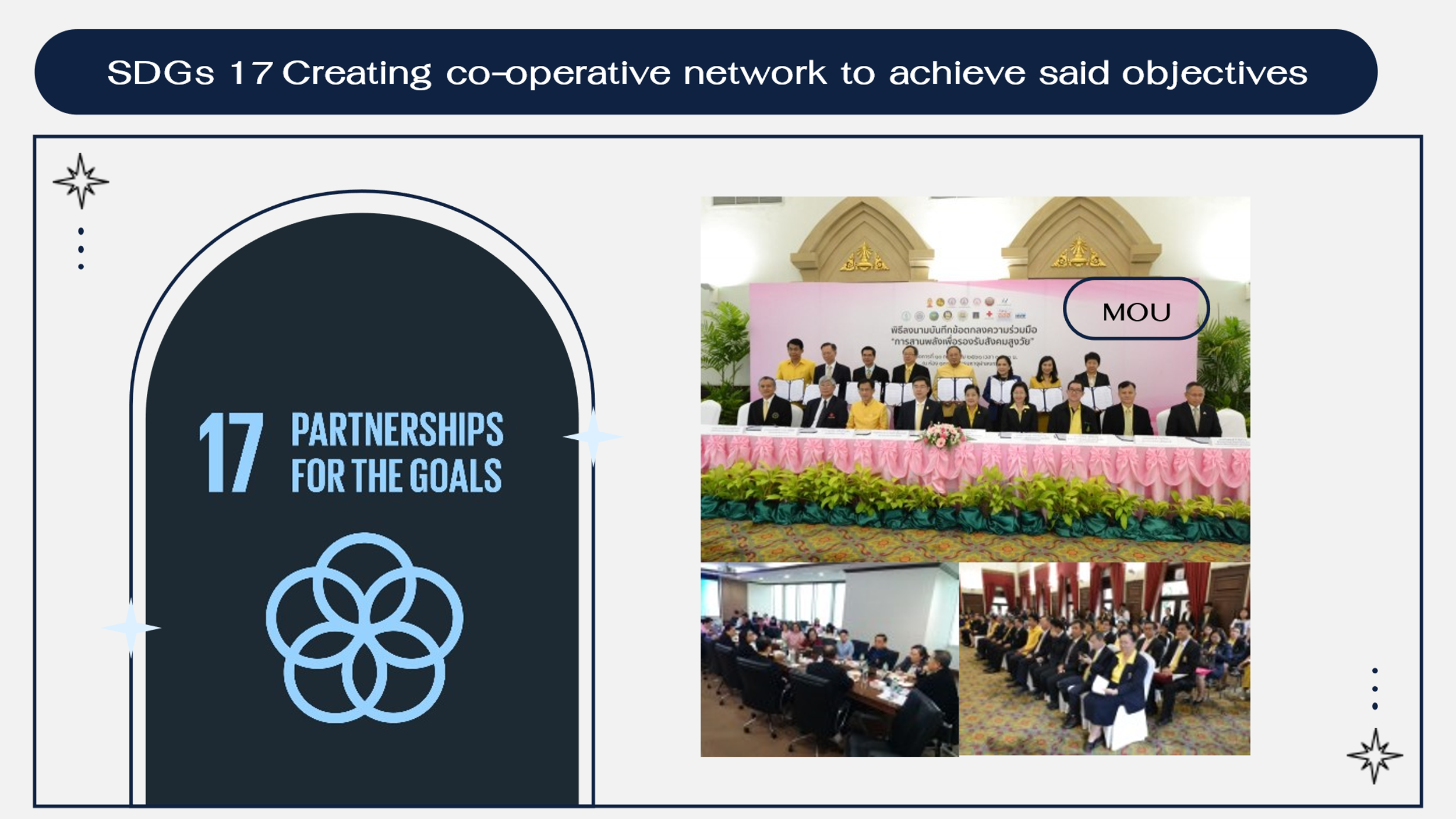
Thai ARi project is a product of the extension of action research and the expansion of a model system for the ageing society in metropolitan areas to mobilize educational institutions, communities and other sectors to improve the quality of life of the older persons to other urban communities. These communities are expected to empower the older persons so they may co-exist happily with people of all ages, in order to support the ageing society in the future.
These are the development plans to support the ageing society in the future:
- Data-driven policy to drive government policies to support the ageing society at the local level.
- Health and medical services to promote preventive measures, care and health rehabilitation at the community and household level, with healthcare robots to reach out to healthcare professionals timely and quickly.
- Economic and social aspects; pushing for appropriate measures to increase opportunities for the Thai economy through innovative services and products to support the ageing society or provide opportunities for older persons to be employed, using ‘universal design’ which is suitable for people of all ages in the urban areas in all regions of Thailand.
- Education for all members of the Thai society to be aware and prepared to support continuous learning through all stages of their lives.
Evidently, Chula ARi fuels cooperation between universities in the creation and transformation of research into policies and practices that produce concrete results. The project aims to create a model of systems for local ageing population that is consistent with the context of each region and information systems to drive life-long learning. The project is also preparing the new generation to become quality senior citizens and develop economic stability and innovation which will provide sustainable foundation in the life of the older persons. The ultimate goal is the sustainability of the system that can be self-operated and self-regulated by the local community, with support from local universities.
